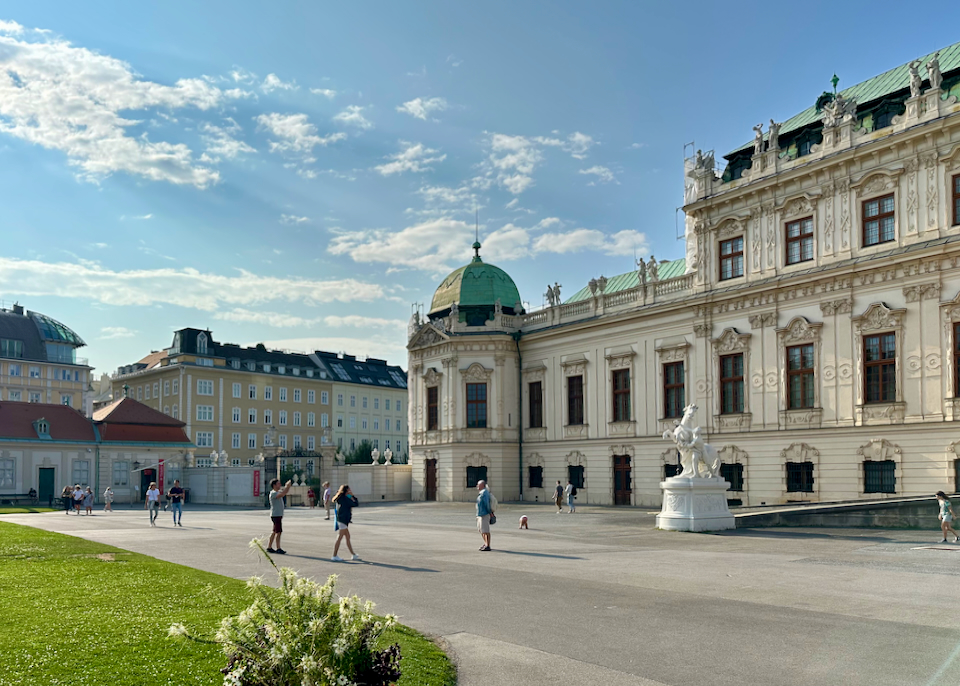
Visit beautiful Belvedere Palace in Vienna to experience stunning Baroque architecture and world-class art, including Klimt’s The Kiss. Our favorite hotel that’s walkable to the palace is Andaz Vienna Am Belvedere.
The Best Area to Stay in Vienna
For almost a thousand years, Vienna was the capital of a great central European empire, not just Austria. It attracted artists such as Klimt and Schiele, great thinkers such as Freud, Wittgenstein, Karl Popper, and the Vienna Circle, and most famously, great musicians and composers, from Strauss and Mozart to Brahms and Beethoven. Much of its appeal today is thanks to those glory days, when the Habsburgs ruled the Austro-Hungarian Empire and Viennese coffeehouses and ballrooms were the toast of Europe. You can still watch the Lipizzaner stallions training at the Spanish Riding School, tour the vast Hofburg palace complex and the Stephansdom cathedral, sip coffee and sample the cakes at a konditorei, or soak up the art in one of the city’s many museums. All around town you’ll be met with Gothic and Baroque churches, Otto Wagner’s impressive turn of the century Modernist buildings, and now and then, a sprawling Baroque palace.
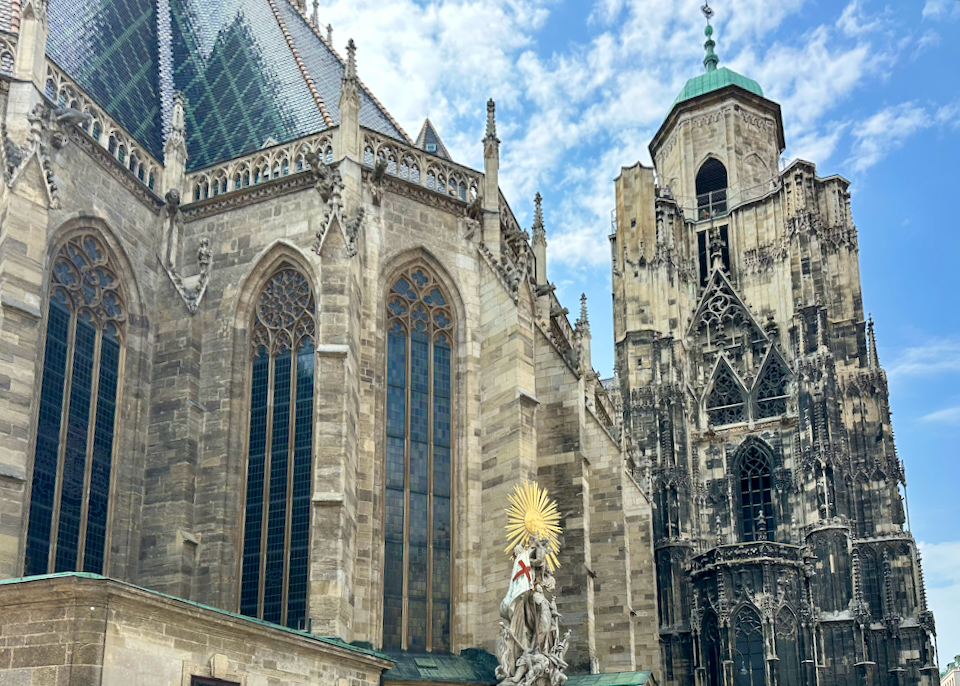
Vienna’s St. Stephen’s Cathedral is a breathtaking Gothic masterpiece and an iconic symbol of the city’s rich history and culture. Our favorite hotel near St Stephen’s is the Leo Grand, just a block away. DO & CO, which is also great, sits right on Stephansplatz overlooking the cathedral.
Best Places to Stay in Vienna
There are hundreds of hotels in Vienna, scattered across the entire city, but nearly all Vienna’s major attractions are packed into the Innere Stadt (Inner City, or the 1st District) – which includes most areas within the Ringstrasse, a 3.3-mile long “Ring Road” where the old fortifications of the city once stood. Today, a tram runs along the Ringstrasse, and hopping on and off is a great way to do a DIY tour and get your bearings. Top sights in the Innere Stadt include St Stephen’s Cathedral, the Albertina Museum, Mozart’s House, the Hofburg and its surrounding parks and museums, and much more. You could spend a week in Vienna without leaving the Innere Stadt and still miss some of the amazing things to see here. In whole, Vienna is divided into 23 districts, with most of the population living outside of the pricey and tourism-dominated Innere Stadt. Staying just outside the old center in places like Neubauor near the Belvedere Palace will give you a more local experience in addition to proximity to the main sights – you’ll also save on hotel rates.
Hofburg Palace
Bordering the southwest of the Innere Stadt, you’ll find the Museum District (Museumsquartier) with, as you’d guess, a handful of excellent museums, the top pick being the Leopold, holding a massive collection of Austrian art that includes showstoppers from Klimt and Schiele. The MUMOK modern art museum is a short walk away and not to be missed for art lovers. Walk a few minutes east and you’ll find yourself in the Neubau neighborhood, a wonderful mix of cobblestone streets and grand apartment buildings with arty shops, innovative restaurants, and lively corner bars.
The excellent Leopold Museum in Museumsquartier.
To the south of the Innere Stadt sits the busy area around Karlsplatz, one of the city’s major transport hubs, as well as a mix of stately old edifices and more modern buildings. Nearby is the monumental Karlskirche, one of Vienna’s landmark churches, and the Art Nouveau Secession building, home to Klimt’s iconic Beethoven Frieze. From the Karlsplatz metro station, it’s only a 5-minute walk to Naschmarkt, the city’s largest market and a great place to shop and eat. Further south you’ll find the Third Man Museum, dedicated to the iconic black and white movie, and Franz Schubert’s last residence.
Continuing east, the energetic pace calms a bit in the less-touristy residential district of Landstrasse that includes Belvedere Palace. This neighborhood has lots of locally-oriented shops, a few cafes and restaurants, and a friendly vibe, plus it’s an easy walk to the city center. Belvedere Palace itself is one of Vienna’s top sights and you could easily spend a whole day here marveling at the works of art inside (including Gustave Klimt’s The Kiss) and the sprawling royal gardens.
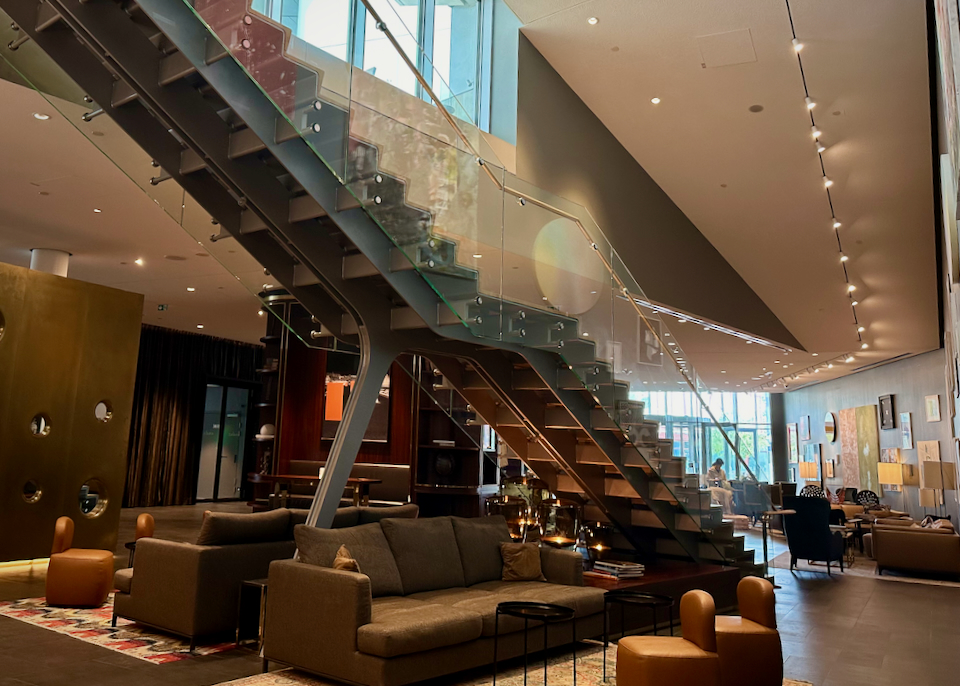
We really like the Andaz Vienna Am Belvedere. It has spacious rooms and a lovely rooftop terrace in a picturesque location just next to Belvedere Palace. Great breakfast, too.
To the east of Landstrasse and Innere Stadt, across the Danube Canal, are up-and-coming Leopoldstadt and Prater neighborhoods. Aside from the mellow array of increasingly gentrified shops, cafes, and restaurants, there’s the huge Prater Park itself with tons of cycling and walking paths, the famous giant Ferris Wheel and Wurstelprater amusement park – a great stop if you have kids.
Bordering the Innere Stadt to the northeast are the densely populated, grittier student neighborhoods of Josefstadt and Alsergrund. There are some good sights here including the Freud Museum, Schubert’s Birthplace, the glorious Liechtenstein Palace, as well as the venerable University of Vienna.
University of Vienna
Farther outside the Ringstrasse is a more suburban-feeling neighborhood around Schönbrunn Palace. Aside from the palace itself, which is arguably Vienna’s top sight, you’ll also be near other interesting stops such as Klimt Villa (the artist’s last studio), and Otto Wagner’s beautiful, golden-topped Steinhof Church. Staying out this way gives you more of a look into everyday Viennese life, and it is under 20 minutes from the Innere Stadt by subway.
Vienna’s Schönbrunn Palace is a magnificent former imperial summer residence known for its opulent Baroque architecture and lavish gardens. It’s well-worth visiting for a glimpse into the grandeur of the Habsburg dynasty and Austria’s royal heritage.
You might also consider staying in the Favoriten district to be close to Vienna’s highly futuristic main train station (Wien Hauptbahnhof) – convenient for regional trains but still only a short tram ride from the city center (or walk from Belvedere Palace). This is also the home of FK Austria Wien, one of the most successful Austrian Bundesliga (soccer) teams.
Finally, across the main channel of the Danube itself, modern Donaustadt makes quite a contrast to the rest of the city, with its huge shopping malls, clusters of skyscrapers, and wide-open spaces, especially on Danube Island (Donauinsel) and in leafy Donaupark, home to the soaring Danube Tower (Donauturm). You can also tour the United Nations headquarters in Vienna, and visit the site of Napoleon’s first defeat in a major battle.
While it’s relatively easy to explore Vienna’s historic center on foot, it’s a large city and you’ll need to use its excellent public transport system to go further afield. The system comprises subway, trams, and buses, with single tickets (€2.40) and 24-hour tickets (€8) valid throughout. It can be useful to have a rental car when exploring the region around the city, but there’s really no need to use one in Vienna itself – streets are narrow, often crowded, and parking can be tough to find, especially in the Innere Stadt.
The Best Places to Stay in Vienna
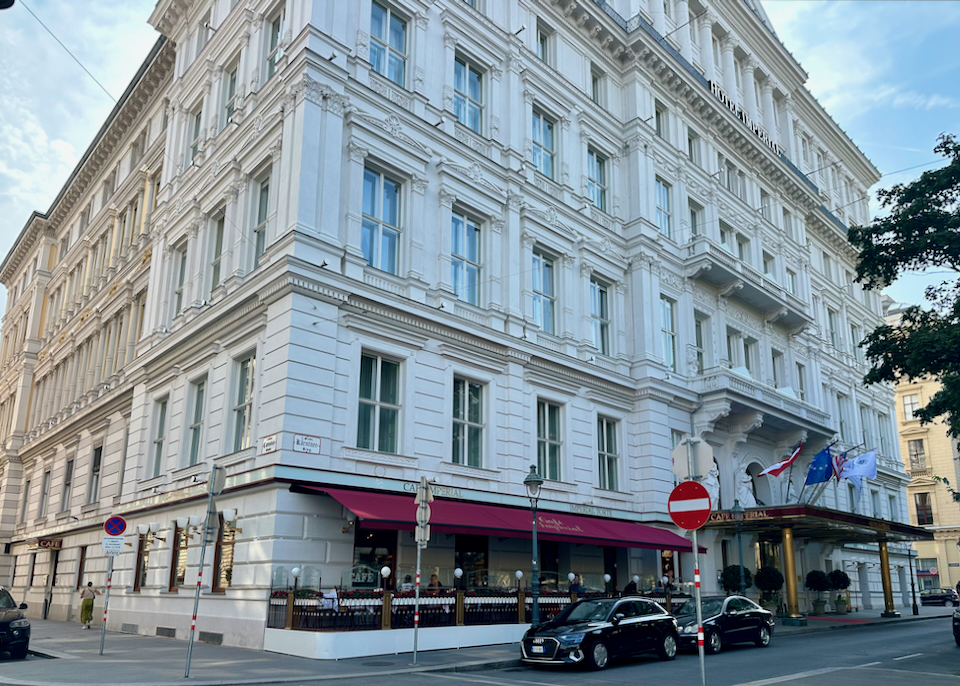
The centrally-located and impeccably elegant 5-star Hotel Imperial is our favorite luxury hotel in Vienna.
- Best Luxury Hotels in Vienna
Grand Hotel Wien • Hotel Imperial • Hotel Sacher Wien • Park Hyatt • Ritz-Carlton • Rosewood Vienna • Sans Souci Wien • Hotel Bristol- Best Boutique Hotels in Vienna
DO & CO • The Guesthouse Vienna • The Harmonie Vienna • Hollmann Beletage • Hotel MOTTO • Hotel Schani Salon • Leo Grand • Saint Shermin- Best Cheap/Midrange Hotels in Vienna
Boutique Hotel Stadthalle • City Pension • Grätzlhotel • H+ Hotel • Hotel Am Parkring • Hotel Beethoven • Hotel Capricorno • Hotel The Weekend • Jaz in the City • Pension Mozart • Ruby Marie • Singerstrasse 21/25 • Superbude Wien Prater • Zoku ViennaFor travelers to want to stay near the central train station, Motel One Wien-Staatsoper is a great option that’s just across the street.
Best Places in Vienna for…
- Best Area in Vienna for Sightseeing: Innere Stadt
Sightseeing in the Innere Stadt is a matter of simply turning the nearest corner to admire more romantic cobblestone streets, Gothic churches, and world-class museums. Start at the Hofburg, and maybe on day two, make it to the Albertina area and then to St Stephen’s Cathedral right in the heart of the city. Then, of course, there’s saying hello to the Mozart Monument in the Burggarten, watching the Lipizzaner stallions perform at the Spanish Riding School, or grabbing a slice of sachertorte at Café Sacher. It’s also easy to access the rest of the city from here, with Stephansplatz station a central hub for the subway system.
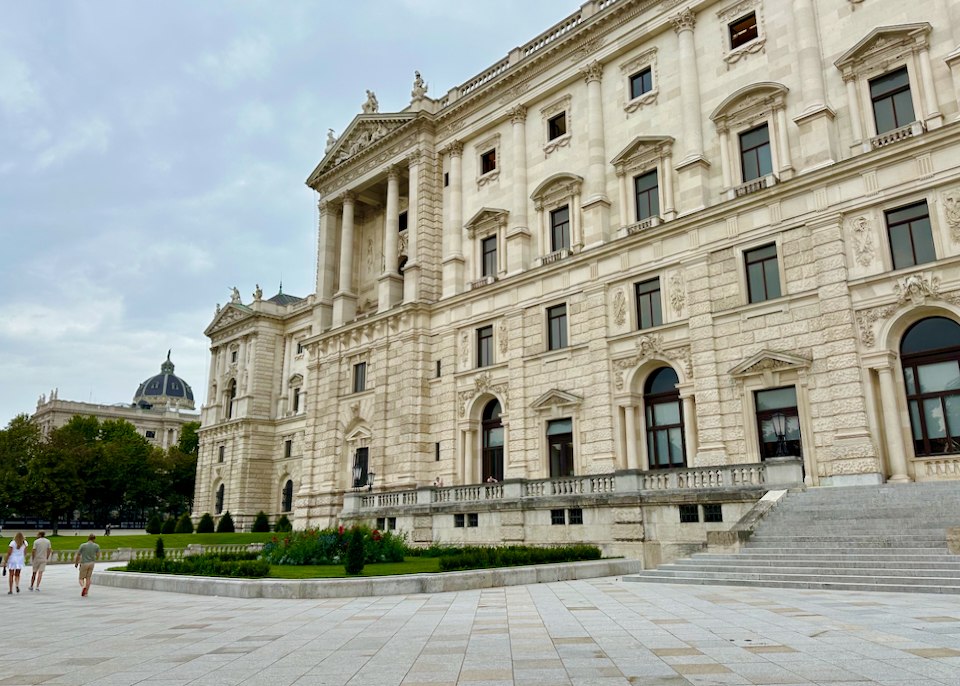
The Hofburg
- Best Areas in Vienna for Nightlife: Innere Stadt and Josefstadt/Alsergrund
Nightlife in Vienna has been rapidly expanding from “a night at the opera” into a scene that encompasses everything from wine bars and fancy cocktail lounges to easy-going neighborhood pubs and classic old coffee houses. The Innere Stadt has all these options alongside the opera and live music venues, and many are in short walking distance of one another. Since the 1980s one of the city’s most popular nightlife areas has been known as the Bermudadreieck or “Bermuda Triangle”, loosely the area around St. Rupert’s Church (along Seitenstettengasse and Rabensteig). Top (but rather pricey) bars here include First Floor Bar, Meinz Cocktail Bar, Bermuda Bräu, and Heartbeat Cocktail Bar. Bigger commercial clubs can be found along the Ring, like O – Der Klub, Volksgarten, and Babenberger Passage (where the dress code is definitely upscale). Over on the Danube Canal, Flex club is known for its booming sound system. Don’t miss also the Loos American Bar, south of the cathedral, an architectural gem designed by lauded Austrian architect Adolf Loos in 1908. On the southwestern edge of the Innere Stadt, the Museum District is another nightlife hotspot, with places like Cafe Leopold reverting to lounge and club at night.That said, it’s still quite sophisticated in the city center and twenty-somethings may enjoy heading over to Josefstadt for a younger, hipper, and wilder scene. You’ll find numerous clubs and live music venues along the Gürtel (belt-road) at the western edge of the district, beneath the old U-Bahn arches: Chelsea, Loop, Coco, Rhiz, Cafe Carina, and many more. You’ll find another cluster of nightspots on the same belt road but further north in Alsergrund (Pappala Pub and Halbestadt to name just two).
Serious clubbers should consider a trip out to the Prater, where the Pratersauna and Fluc & Fluc Wanne host international guest DJs and major theme nights.
- Best Area in Vienna for Food and Restaurants: Around Karlsplatz and Naschmarkt
Though the Innere Stadt is packed with great restaurants (everything from food-truck sausages to cake at the famous Café Sacher), Michelin-starred vegetarian fare, and haute cuisine with views over the city), foodies should aim for the international line-up of stalls and sit-down restaurants in and around the Naschmarkt. The nearby Freihausviertel neighborhood, to the south along Schleifmühlgasse, is lined with cafés and diners, catering more to locals than tourists: Café Anzengruber, pizza at Pinsatore, Alt Wien Kaffee, and more. The area to the north of Naschmarkt, particularly the streets between Gumpendorfer Strasse and Mariahilfer Strasse, are also packed with excellent places to eat; Gumpendorfer Stube for Austrian, Stella Marina for Italian, MaBelle Bistro for French cuisine, and Mama Liu & Sons for Chinese.Café Sacher, birthplace of – and the best place in Vienna to get – the famous sachertorte, is housed inside the excellent Hotel Sacher Wien Hotel in Innere Stadt.
Iris Modern Greek restaurant in Naschmarkt
Though there are highly rated fine dining restaurants throughout Vienna – we love Amador in Döbling and Pramerl & the Wolf in Alsergrund – you’ll find the biggest concentration in the Innere Stadt. Buxbaum, Edvard, Konstantin Filippou, Steirereck im Stadtpark, and Duchardt are all top choices.
- Best Area in Vienna for Families: Leopoldstadt
Basing yourself in Leopoldstadt puts you in a more residential area and near the massive and family-friendly Augarten. You’re also about a 15-minute walk to Prater, home of the city’s big amusement park, the giant Ferris wheel, Madame Tussauds Vienna, Planetarium, the Liliputbahn (mini railway), and miles of hiking and biking trails. All only a 20-minute walk or 8-minute Uber ride from the city center.Prater Park
- Most Romantic Area in Vienna: Neubau & Museum District, and Schönbrunn Palace
Right next to the Hofburg, rose gardens, and horse-drawn carriages winding around cobblestone streets, yet quietly tucked away in a neighborhood where you can become entwined in real-life Vienna, the Museum District is the perfect spot for a romantic getaway. A few minutes of walking and you’re in the heart of sightseeing; a few minutes in the other direction and you can discover an outdoor patio restaurant to sip wine and feel like a local in Neubau. There are some great boutique hotels here: HENRI Hotel Wien, Das Tyrol, Hotel MOTTO, Hotel Schani Salon, and Boutique Hotel Stadthalle.To the west, the Schönbrunn Palace is perhaps the most romantic destination in all Vienna, with its beautiful gardens, pools, terraces, and fountains open free of charge. There’s also Klimt Villa, the artist’s last studio, as well as the gorgeous 19th-century Hermesvilla (built for Empress Elisabeth, aka Sisi) within Lainzer Tiergarten, a section of the hilly Vienna Woods that’s perfect for long walks. Parkhotel Schönbrunn is a charming place to stay, but it’s also possible to rent a suite in Schönbrunn Palace itself.
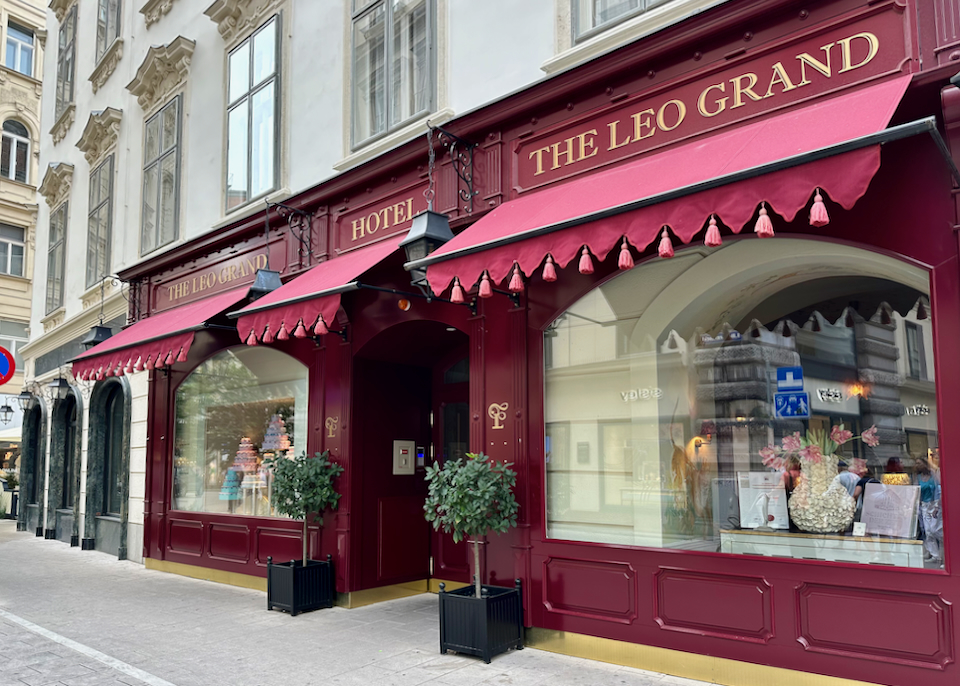
The exceptional Leo Grand boutique hotel is our favorite hotels in Innere Stadt, and our top Innere Stadt pick for a couples’ getaway.
- Best Area in Vienna for a Local Vibe: Leopoldstadt
Staying in this neighborhood across the Danube Canal from Innere Stadt gets you away from the tourists and into a more local, newly gentrifying scene. Stroll beautiful parks and residential streets, sip coffee in classic cafés like Balthasar Coffee Bar, and grab a drink in beer gardens like Schweizerhaus. Restaurants popular with locals include the Mochi Ramen Bar, the Austrian restaurants Zum Friedensrichter and hip Skopik & Lohn, and Schank Zum Reichsapfel, an enchanting heuriger (wine tavern). And Leopoldstadt is within a 10 to 20-minute walk to the Innere Stadt.- Best Area in Vienna for Walking: Innere Stadt
Any neighborhood in Vienna is great for walking, but the Innere Stadt is the most central, so it’s quick and easy to get just about anywhere. You can also wander aimlessly to find narrow lanes and elegant boulevards while admiring several styles of historic architecture in the form of Gothic churches, grand museums, and once-royal addresses.St Stephen’s Church in Innere Stadt
- Best Area for Shopping: Mariahilfer Strasse (Museum District and Neubau)
Vienna’s poshest boutiques line Kohlmarkt, Graben, and Kärntner Strasse in the Innere Stadt, but it’s far more interesting to peruse the stores on Mariahilfer Strasse southwest of the Museum District. Here you’ll find major brands such as H&M, Jack Wolfskin, Pull & Bear, Puma, Snipes, Nike, New Yorker, and the Gerngross department store, as well as more independent stores like the Mauerer hat shop, the M.Gibian skateboard shop, and the Miller stationary store. There’s also Haydn Kino, one of Vienna’s English-language movie theaters, and traditional coffee shops like Café Ritter.Vienna’s biggest shopping malls tend to lie outside the city center: Westfield Donau Zentrum in Donaustadt, Millennium City in Brigittenau, and Westfield Shopping City Süd on the southern outskirts.
- Safety in Vienna
Anywhere in central Vienna tends to be very safe and the city, in general, is uncommonly safe, especially if you take the standard precautions of being aware of your surroundings, watching out for pickpockets in busy areas, and not walking alone inebriated late at night, especially around the Gürtel (belt-road). Prater and Josefstadt/Gürtelcan get a little dodgy late at night but in general, and especially in the Innere Stadt, Vienna is very safe.The 9 Best Neighborhoods in Vienna for Tourists
1. Innere Stadt
The Innere Stadt (“Inner City”) is the historic heart of Vienna and is where all the major attractions are located. It is an extremely scenic area of cobblestone streets, Gothic churches, incredible museums, and lanes of grand old apartment buildings – as well as being the city’s best spot for shopping, drinking, and dining. Though there is still plenty of business conducted here, it’s the least populated district of Vienna – like many of Europe’s showcase cities, much of the area is now completely dominated by tourism. If you can afford it, it makes sense to stay in the Innere Stadt, especially if you have limited time – you’ll be able to walk to all the main sights.
Most visitors begin at the spiritual heart of the city, Stephansplatz, dominated by the spires and zig-zag roof of St Stephen’s Cathedral; climb to the observation platform for sensational views over the city. Nearby, the apartment in which Mozart lived from 1784 to 1787 is now a museum (Mozartwohnung), and you can also see the house where he died at Rauhensteingasse 8. In the narrow streets north of Stephansplatz, you’ll find Vienna’s oldest tavern, the Griechenbeisl (dating from 1490), as well as the 8th-century Kirche St. Ruprecht, Vienna’s oldest church. To the east, the Museum of Applied Arts (MAK) is one of the city’s most innovative spaces, dedicated to design, architecture, and contemporary art.
St Stephen’s Church (Domkirche St Stephan)
Leading south from Stephansplatz is traffic-free Kärntnerstrasse, Vienna’s traditional main drag, now crammed with tourists but still home to some of the city’s most historic shops like Lobmeyr glassware (no. 26). Below the nearby Kapuzinerkirche (Church of the Capuchin Friars) lies the Kaisergruft, a crypt containing hundreds of Hapsburgs, including Empress Maria Theresa, Emperor Franz Joseph, and Empress Elisabeth (aka “Sisi”). Kärntnerstrasse continues south passing Hotel Sacher, home of the celebrated sacher torte (chocolate cake), and the grand Staatsoper opera house (shown above). Nearby is the Albertina, another Hapsburg palace serving as a magnificent art museum, and the Theatermuseum, which charts the history Austrian theater and puppetry, and includes the Eroica Hall where Beethoven’s Third Symphony was first performed.
The Albertina
The enlightening Jewish Museum charts the history of the city’s Jewish community from the Middle Ages through to its obliteration by Nazis in World War II. The medieval center of the Jewish Quarter, north of Stephansplatz, was Judenplatz, where the Museum Judenplatz focuses on day-to-day medieval Jewish life, and the Memorial to the Victims of the Holocaust commemorates the 65,000 Austrian Jews murdered by the Nazis. West of Stephansplatz, the Graben and Kohlmarkt are home to some of Vienna’s oldest shops and coffee houses, while the Pasqualatihaus is a museum dedicated to Beethoven, who lived here several times between 1803 and 1815.
The Hofburg
The Hofburg and Around
For many visitors, the real highlight of the city center is the gargantuan Hofburg, the main palace complex built by the Hapsburg emperors – part of it is still reserved for the President of Austria. Today, the main public section of the palace is encompassed within the Sisi Museum, which fittingly begins with an exhibition dedicated to the beloved Empress Elisabeth (aka Sisi), who was assassinated in 1898. The same ticket provides entry to the Imperial Apartments, opulent rooms used by Elisabeth and her husband, Emperor Franz Joseph, and the Imperial Silver Collection, which includes lavish porcelain dinner sets and table décor. You’ll need a separate ticket to visit the adjacent Spanish Riding School, home to the famous Lipizzaner stallions (you’ll also need to book head to see the horses perform in shows or public training sessions). Don’t miss the Schatzkammer (Imperial Treasury), home to an astounding collection of robes, jewels, crowns and gold regalia once belonging to the Hapsburgs and the Holy Roman Emperors – including the imperial crown itself.Over in the Neue Burg palace wing you can visit the National Library, Ephesos Museum (of ancient Greek and Roman antiquities), Weltmuseum (an ethnographic museum), the House of Austrian History (covering post World War II Austria), the Arms and Armor Collection, and the Historical Musical Instruments collection. Finally, south of the palace, facing each other on either side of Maria-Theresien-Platz, are two more fabulous museums. The Kunsthistorisches Museum contains a huge collection of grand masters, from Caravaggio and Dürer, to Rembrandt and Rubens. The highlight of the Naturhistorisches Museum (Natural History Museum) is the Venus of Willendorf, a 25,000-year-old figurine.
The choice of hotels here is vast – we’ve selected the best options below. These include some of the most luxurious hotels in Europe, which tend to be very expensive, but there are also some bargains around.
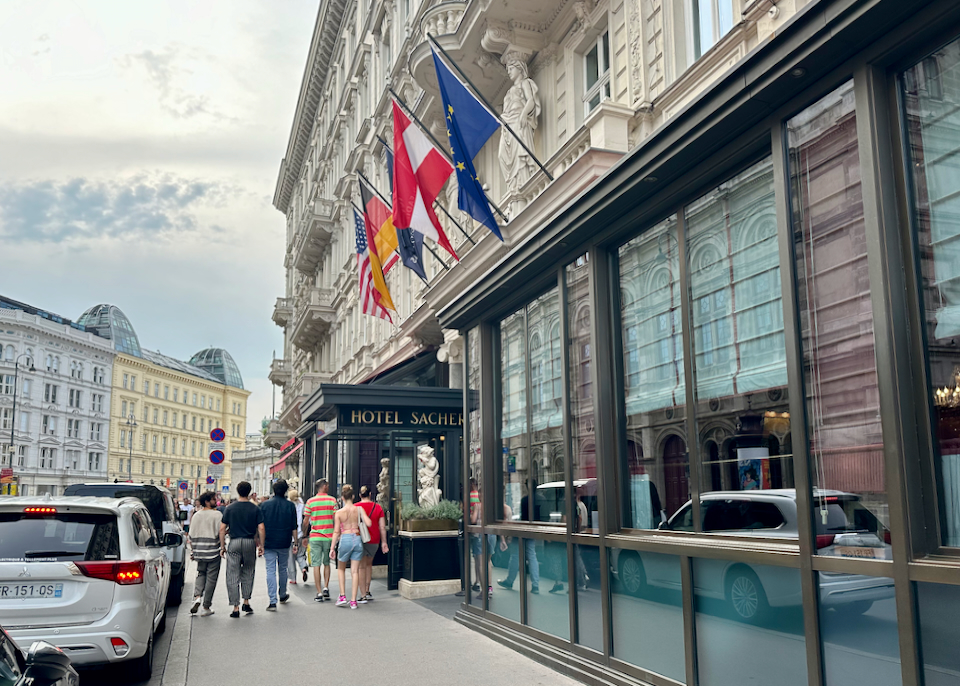
Hotel Sacher offers a timelessly elegant experience in a south Innerstadt location that’s convenient for all of the districts best sights. It’s a worthwhile splurge if you have the means.
- The Best Hotels in Innere Stadt
DO & CO • Grand Hotel Wien • The Guesthouse Vienna • Hollmann Beletage • Hotel Bristol • Hotel Imperial • Hotel Sacher Wien • Leo Grand • Palais Hansen • Park Hyatt • Ritz-Carlton • Rosewood Vienna • Schlosshotel Römischer Kaiser • Steigenberger Hotel Herrenhof- Best Cheap/MidrangeHotels
City Pension • Hotel Am Parkring • Hotel Austria • Hotel Capricorno • Hotel Kaiserin Elisabeth • Singerstrasse 21/252. Neubau & the Museum District
Just southwest of the Hofburg, the Museum District (“MuseumsQuartier”) contains the city’s best modern museums, including the elegant Leopold Museum (home to works by Egon Schiele, Klimt and other late 19th century German and Austrian artists), and chic MOMOK, which owns over 10,000 works of Modern and Contemporary art (photography, film, paintings, sculpture, and installations). The Architekturzentrum Wien focuses on Austrian architecture and design, while the Kunsthalle Wien Museumsquartier hosts high quality Contemporary art exhibitions. The Tanzquartier is one of Europe’s most innovative performing arts and contemporary dance centers. Even though the Museum District lies on the outside of the Ringstrasse, it still feels like the city center.
The Leopold Museum
MUMOK (Museum Moderner Kunst Stiftung Ludwig Wien)
A stroll further east lies Neubau, with beautiful old architecture that houses some of the more cutting-edge restaurants, indie stores, and art galleries. If you’ve just finished a day visiting the museums, wander only a few minutes over to Neubau for dinner or drinks to feel more out of the tourist zone. Amerlingbeisl is a good choice, with a tranquil Biedermeier-style inner courtyard.
Neubau
This area houses many superb boutique hotels at cheaper rates than those found in the Innere Stadt.
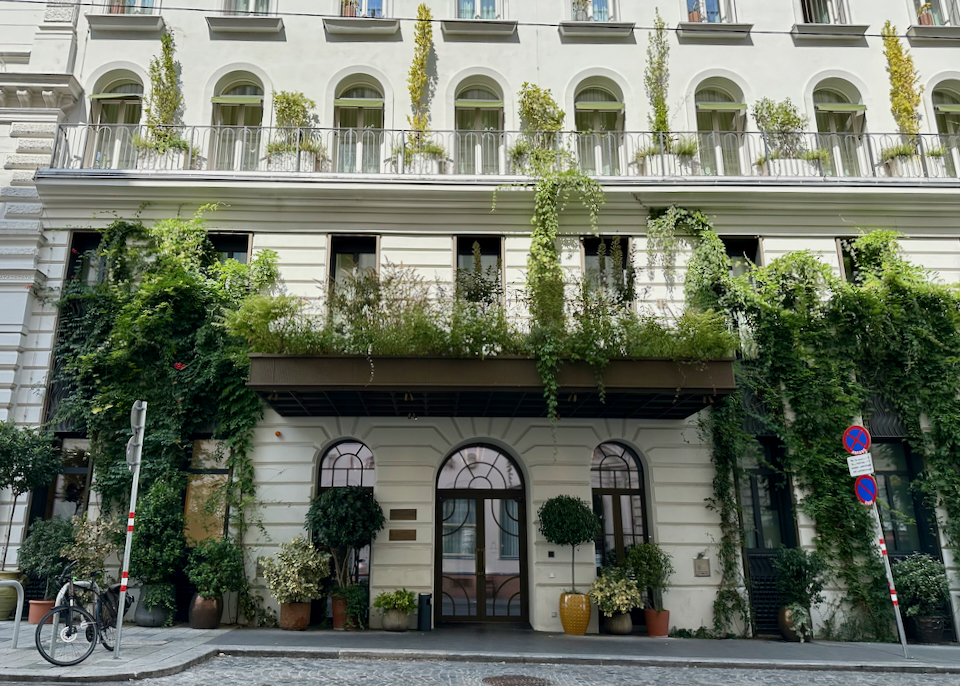
Hotel MOTTO is one of our favorite boutique hotels in Vienna – it’s cozy and chic, with a great restaurant and rooftop bar.
- The Best Hotels in Neubau & the Museum District
25hours at MuseumsQuartier • HENRI Hotel Wien • Hotel Das Tyrol • Hotel Alstadt • Hotel MOTTO • Hotel Schani Salon • NH Collection Wien Zentrum • Sans Souci Wien- Best Cheap/Midrange Hotels
Boutique Hotel Stadthalle • Hotel The Weekend • Jaz in the City • Pension Mozart • Ruby Marie3. Karlsplatz & Naschmarkt
Karlsplatz is a major square and transport hub at the southern end of the Innere Stadt. The adjacent Resselpark is home to one of Vienna’s landmark churches, the vast 18th-century Karlskirche, featuring baroque ceiling frescoes and another viewing platform high above the city roofs. Nearby is the Albertina Modern art museum, the Musikverein Wien concert hall, and a quirky Instagram favorite, the 3D PicArt Museum. The Wien Museum Karlsplatz, which showcases the history of Vienna, recently reopened after a major renovation. On the other side of Resselpark, the glass cube of Kunsthalle Wien Karlsplatz hosts contemporary art exhibitions, while the gilded dome of the Secession building harbors the must-see Beethoven Frieze by Klimt.
Karlskirche (St Charles Church)
Just beyond here along the wide Wienzeile boulevard lies Naschmarkt, Vienna’s largest market, where you can eat at food stalls, buy picnic supplies, and load up on souvenirs. Just to the north, on grassy Schillerplatz, the Academy of Fine Arts Vienna displays an outstanding collection of European paintings, particularly Dutch and Flemish (including The Last Judgement by Hieronymus Bosch). A short walk south of Naschmarktare are a couple of smaller museums that will appeal to aficionados: the Third Man Museum celebrates the iconic 1949 Graham Greene movie set in post-World War II Vienna (starring Orson Welles and shot mostly on location in the city), while the Schubert Sterbewohnung Museum was famous composer Franz Schubert’s last residence – he died here in 1828. Further west in trendy Mariahilf is the Haydnhaus Museum, where composer Joseph Haydn lived from 1797 until his death in 1809.
Naschmarkt
The small neighborhood south of Naschmarkt is known as Freihausviertel, packed with designer shops, art galleries, and a lively dining and café scene, with Schleifmühlgasse the central strip. If you’re in the neighborhood, it’s worth a stop at Café Anzengruber, for its unique blend of Viennese and Croatian cuisine.
This is a fun, less touristy part of the city to stay in, with a smattering of good hotels and lots of apartment rentals.
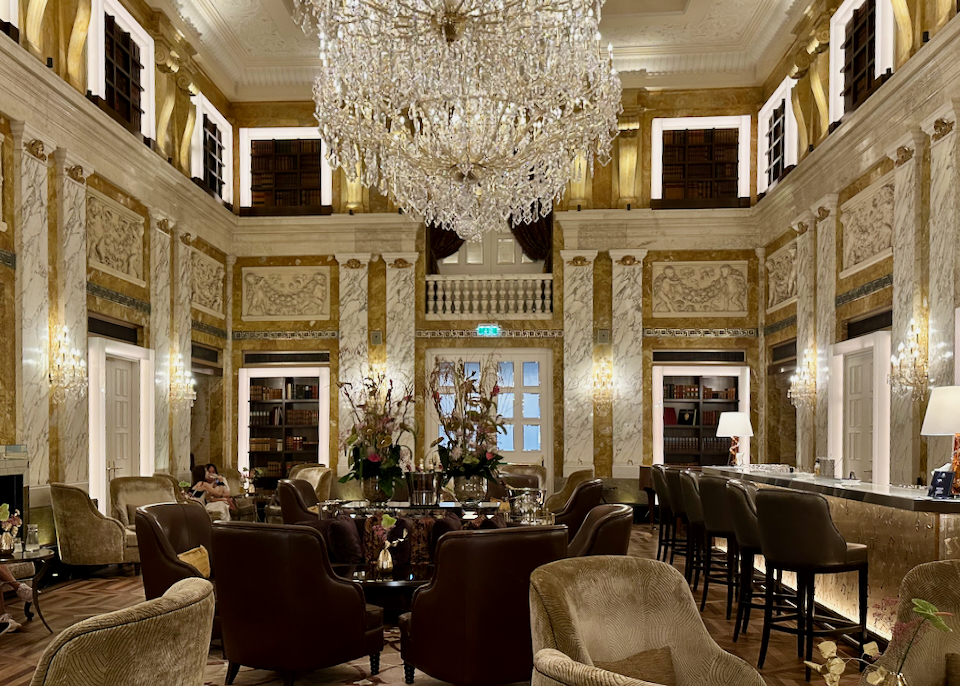
The opululent Hotel Imperial is technically located on the southern edge of Innere Stadt, but just across the wide boulavard from Karlsplatz. It’s our favorite luxury hotel in Vienna, and we feel confident recommending it for both neighboroods.
- Best Hotels in Karlsplatz & Naschmarkt
Hotel Imperial • Hotel Indigo Naschmarkt • Hotel Kaiserhof • Living Hotel an der Oper • Saint Shermin- Best Cheap/Midrange Hotels
Holiday Inn Vienna City • Hotel Beethoven • Motel One Wien-Staatsoper- Good hotels near Haydnhaus include Austria Trend Hotel Anatol and Hotel Josefine.
4. Landstrasse and Belvedere Palace
Landstrasse, Vienna’s sprawling 3rd District southeast of the Innere Stadt, is home to embassies, stately mansions, pretty gardens, and most famously the baroque palaces of The Belvedere (above). Built as a summer residence for Prince Eugene of Savoy in the 18th century and set in gorgeous gardens, the complex includes the Upper Belvedere, home to a fine art collection that includes Klimt’s beloved painting The Kiss. The Lower Belvedere and the Orangery are also exhibition spaces, while at the far southern end of the park, Belvedere 21 showcases contemporary Austrian and international art, film, and music.
A little further south, aficionados will enjoy the Museum of Military History, with especially interesting displays on World War II. It also contains the macabre bloodstained tunic of Archduke Franz Ferdinand and the car in which he was assassinated in Sarajevo in 1914, sparking World War I.
Hundertwasserhaus
There are more sights as you walk towards the Danube Canal, including Haus Wittgenstein, a Modernist townhouse designed by seminal philosopher Ludwig Wittgensteinin the 1920s, and the multi-colored Hundertwasserhaus, a whimsical apartment block designed by Austria’s Friedensreich Hundertwasser. The nearby Kunst Haus Wien (Museum Hundertwasser) exhibits his art.
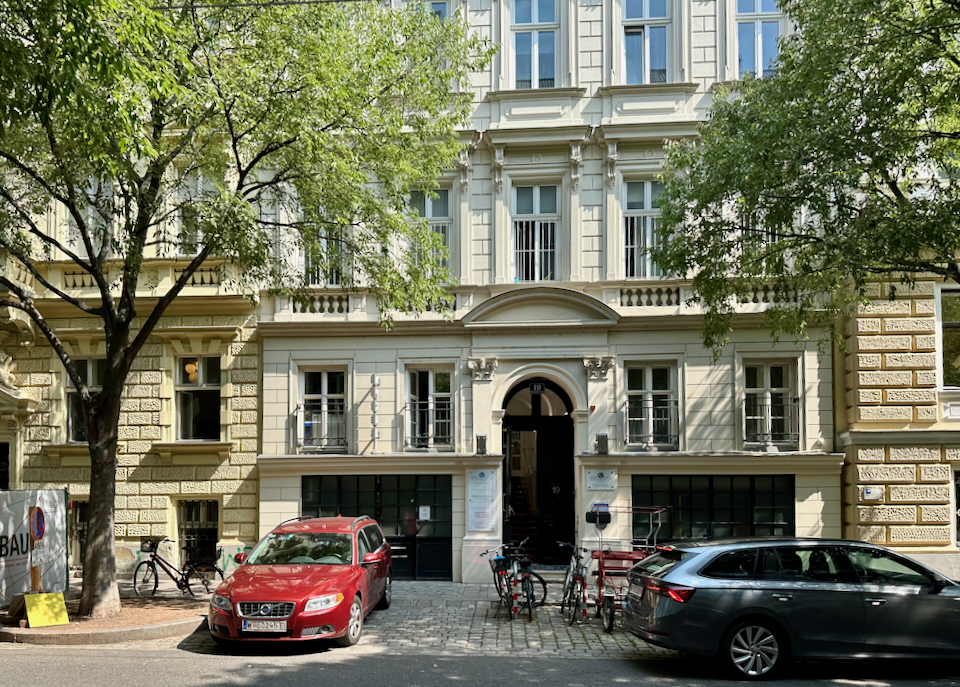
Hotel Spiess & Spiess is a friendly boutique hotel with a townhouse feel. It’s on a quiet, leafy street, but sits really close to the U3 subway line which will take you to the heart of Innere Stadt in 10 minutes.
- Best Hotels in Landstrasse and around Belvedere Palace
Andaz Vienna Am Belvedere • InterContinental • Savoyen- Best Cheap/Midrange Hotels
Gasthof Schwabl Wirt • Hotel Daniel • Hotel Spiess & Spiess • Parks 73 The Town House Hotel • Rioca Vienna Posto 2 • Ruby Sofie5. Leopoldstadt & Prater
Low key and residential yet elegant, the area across the Danube Canal from Innere Stadt is a lovely place to visit especially if you’ve got kids in tow. The biggest sight in Leopoldstadt is Prater Park with its Wurstelprater amusement park, giant Ferris Wheel (which features in The Third Man), and rollercoasters. The Prater is the city’s biggest park and is full of all sorts of attractions: Madame Tussauds Vienna, Planetarium Wien, the Liliputbahn (mini railway), and for adults the famed Schweizerhaus, a beer garden known for its original Czech Budweiser draught beer.
On the east side of the park lies the huge Messe Wien trade fair grounds, and the Ernst Happel Stadium, home of the national Austrian soccer team. You can also check out the Johann Strauss Residence (Johann Strauss Wohnung) where the artist composed “The Blue Danube” waltz in 1867, and the giant Augarten park (which has a good playground and the Augarten porcelain manufactory).
Hotels here offer much cheaper rates, in return for longer travel times to the rest of the city (though it’s not far to the Innere Stadt).
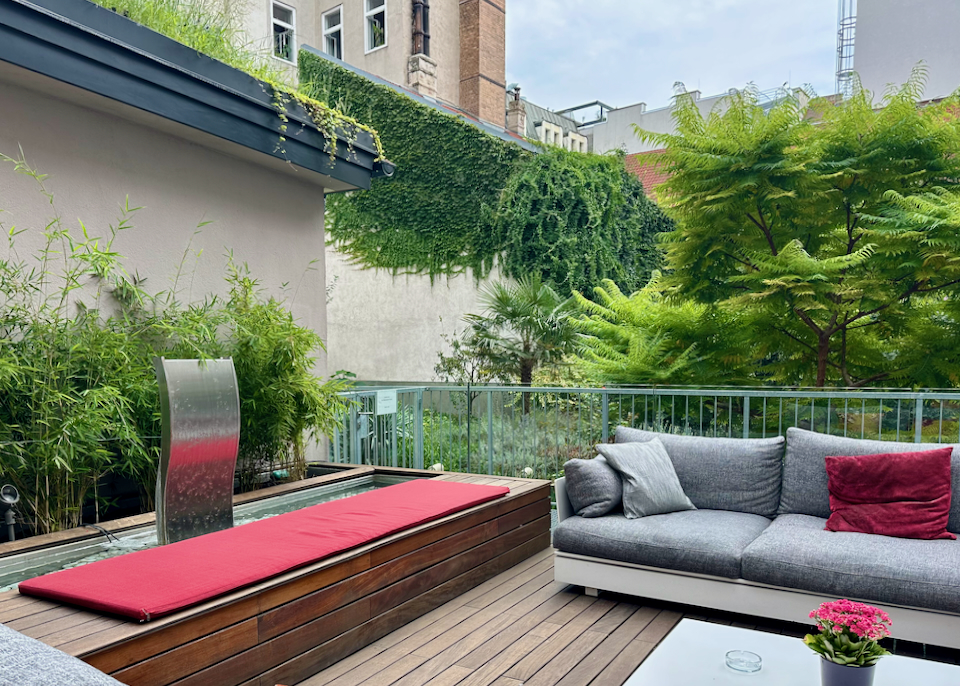
A quiet corner on the charming outdoor terrace at Der Wilhelmshof, a great hotel in Leopoldstadt where some rooms boast views of the Prater Park ferris wheel.
- Best Hotels in Leopoldstadt & Prater
Der Wilhelmshof • Henriette Stadthotel • Hilton Danube Waterfront • Hotel Imlauer Wien • Hotel Stefanie • SO/Vienna- Best Cheap/Midrange Hotels
Austria Classic Hotel • Grätzlhotel • Harry’s Home • ibis Styles Wien Messe Prater • MEININGER Downtown Franz • Motel One Prater • the niu Franz • Social Hub • Superbude Wien Prater • Zoku Vienna6. Josefstadt & Alsergrund
Home to one of Europe’s biggest universities, neighboring Josefstadt (8th District) and Alsergrund (9th District) on the west side of Vienna have a youthful, international buzz. Josefstadt is home to the excellent Austrian Museum of Folk Life and Folk Art, and the grand Rathaus (City Hall, above). The University of Vienna itself is also worth checking out; it’s been around since 1365 and still has the original architecture to prove it. Take a guided tour to get the most out of a visit.
University of Vienna
There are plenty of sights in Alsergrund too, including the absorbing Sigmund Freud Museum (Freud’s home and office from 1891 until he fled the Nazis to England in 1938) and the simply stunning Liechtenstein Garden Palace, one of the lesser-visited of Vienna’s grand royal residences (owned by the rulers of the principality of Liechtenstein). You can also visit Schubert’s Birthplace, as well as the house where Beethoven died at Schwarzspanierstrasse 15.
Liechtenstein Garden Palace
Servitengasse, north of the Freud Museum, is the hub of a small neighborhood known as Servitenviertel, especially popular for its restaurants (it’s also known as “Little Paris” for its resemblance to a chic Parisian neighborhood).
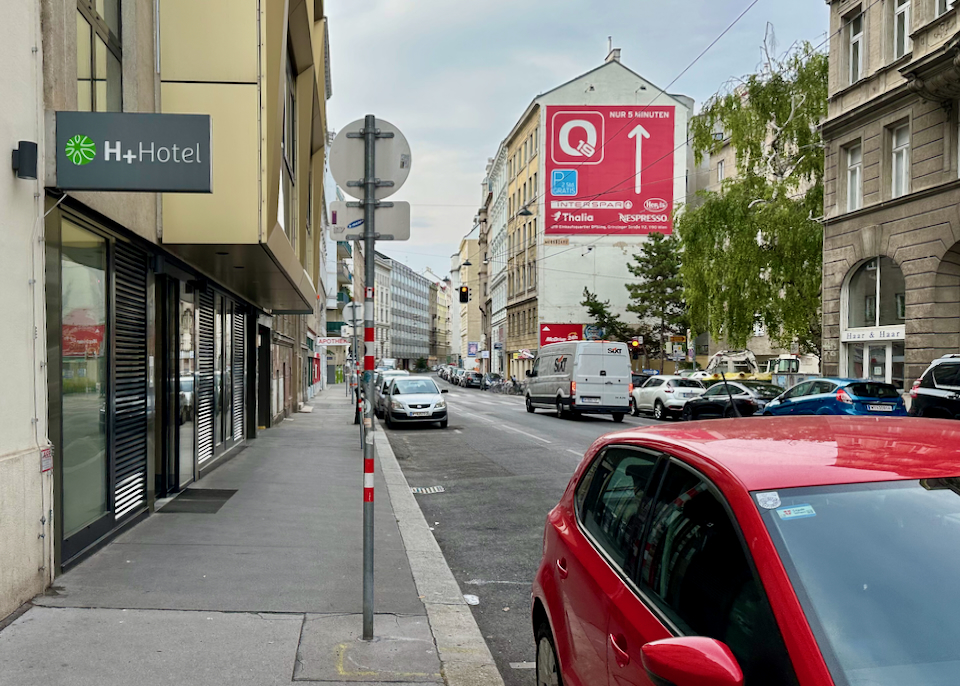
H+ Hotel offers good value and an accessible location that’s close to tram stops, the Friedensbrücke underground station, and the Franz-Josefs-Bahnhof train station.
- Best Hotels in Josefstadt & Alservorstadt/Alsergrund:
The Harmonie Vienna • Hotel Rathaus- Best Cheap/Midrange Hotels
Boutique Hotel Donauwalzer • H+ Hotel • Hotel Zipser •
ibis Styles Wien City • Pension Lehrerhaus • Riess City Hotel7. Favoriten (main train station)
The multicultural 10th District is a diverse residential area south of Belvedere best known for the futuristic Vienna Central Station (Wien Hauptbahnhof). The new station is 2 miles (3km) south of Stephansplatz, so not close enough to walk, but trams will zip you up to Karlsplatz in a few minutes. Staying here is all about the station – if you’d prefer to be within walking distance of the Austrian railhub, there are several brand new, good value hotels nearby, though the area lacks the character of the historic neighborhoods (it’s mostly modern development around the station).
Staying here puts you within walking distance of the southern Belvedere (Schweizer Garten), the Palais Schönburg and some cheap Turkish restaurants. Also worth checking out, the indoor public swimming pool at Amalienbad, a grand 1920s Art Deco sports center, and the soccer games at the Generali-Arena, home to one of the most successful Austrian Bundesliga teams in FK Austria Wien.
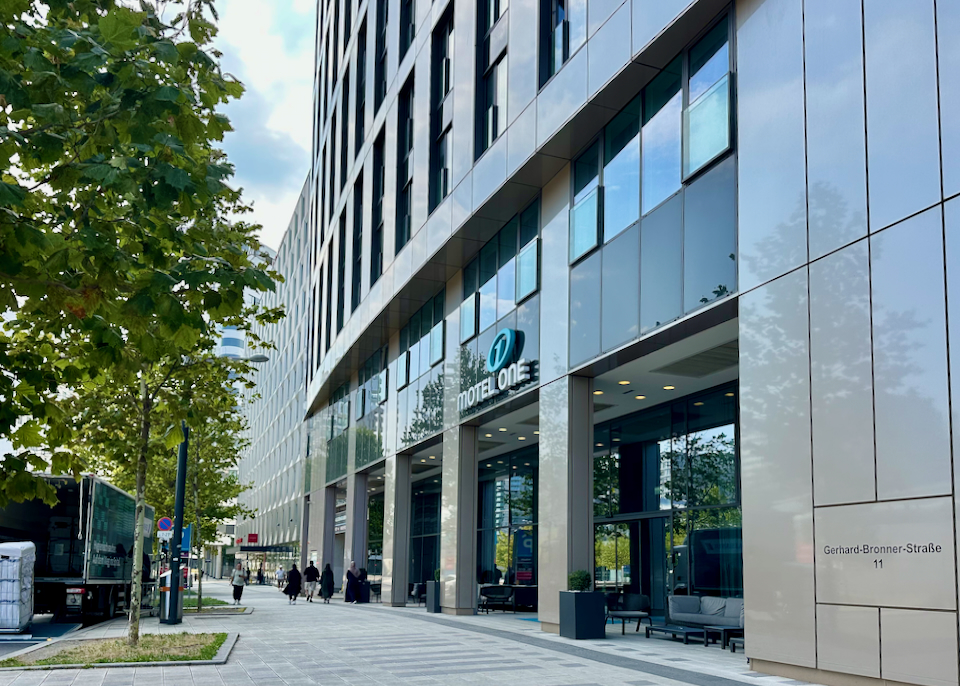
Motel One Hauptbahnhof is our favorite hotel near Vienna’s central train station – it’s just across the street.
- Best Hotels in Favoriten (main train station)
Hotel Zeitgeist Hauptbahnhof • Motel One Hauptbahnhof • Novotel Hauptbahnhof- Best Cheap/Midrange Hotels
B&B Hotel Wien-Hbf • Hotel beim Theresianum • Hotel Caroline • Hotel Schani • ibis Wien Hauptbahnhof8. Around Schonbrünn Palace (Hietzing)
Over in Hietzing, Vienna’s vast 13th District west of the city center, everyone seems to be heading for the Schonbrünn Palace, one of Austria’s premier attractions. The palace is simply immense, but even its size isn’t enough to hold the throngs of tourists heading here in the summer and on holidays. Definitely buy tickets in advance or expect to wait, possibly for hours, to get in. Plan to spend a full day exploring here. The summer residence of the Hapsburgs dates to the 1500s, but what you see today was mostly built during the 1740s and 1750s for Empress Maria Theresa. Must-see rooms are the ornate State Apartments including the Napoleon Room, where the French ruler once stayed, and the exquisite Mirror Room where Mozart performed at age six. The gardens will take most of your time; if you have kids, you might want to consider making two days of it to take your time at the on-site zoo as well. At the southern end, the Hietzing Cemetery contains the graves of Otto Wagner, Gustav Klimt, and other notables.
A small section of the Schonbrunn Palace gardens
The area surrounding the palace is an upscale residential neighborhood, but there are a few other sights around including Klimt Villa, the artist’s last studio, as well as the beautiful 19th-century Hermesvilla (built for Empress Elisabeth, aka Sisi) within Lainzer Tiergarten, a woodland park that’s great for long walks.
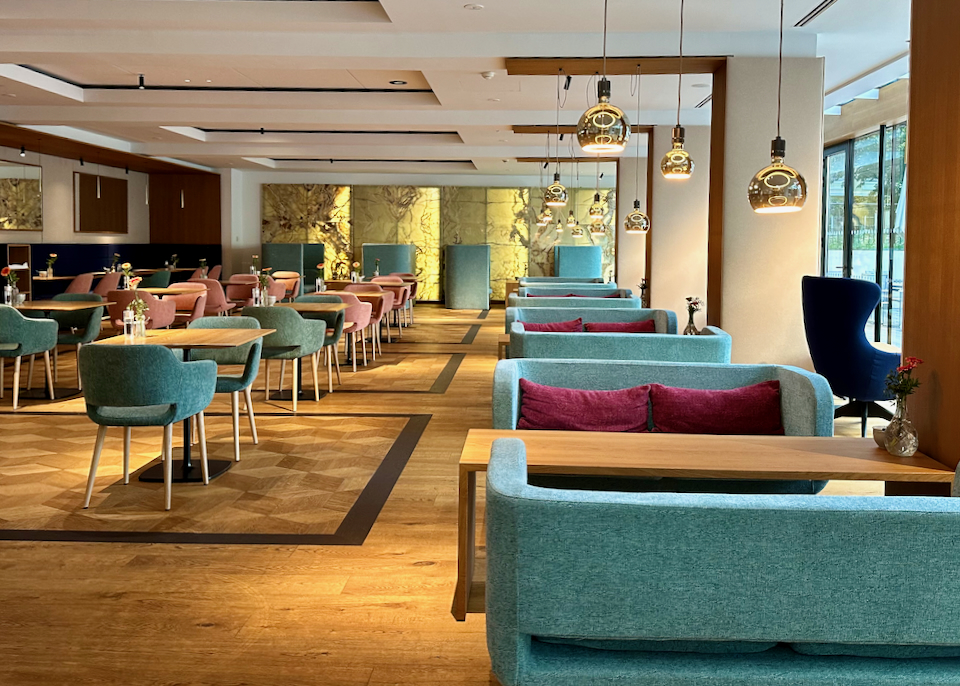
Hotel Maximilian is a wonderful modern 4-star option that’s right next door to Schonbrünn Palace.
- Best Hotels Around Schonbrünn Palace
Hotel Maximilian • Parkhotel Schönbrunn • Renaissance Wein • Schönbrunn Palace Suite • Springer Palace- Best Cheap/Midrange Hotels
Hotel Bergwirt Schönbrunn • Leonardo Hotel9. Donaustadt
Tourists rarely stray across the main channel of the Danube to the 22nd District of Vienna, a primarily residential area with some of the newest commercial developments in the city. For visitors, the main draws include long, narrow Danube Island (Donauinsel), a great place for a quiet hike or bike, and the Donaupark that contains the 827-foot (252-meter) Danube Tower (Donauturm, above), boasting panoramic views all the way to Slovakia.
You can also take guided tours of the Vienna International Centre, the United Nations complex here, or visit Donauzentrum, Vienna’s largest shopping mall. History buffs may want to check out the “Asperner Lion” and the nearby museum commemorating the Battle of Aspern-Essling in 1809, an Austrian victory that was also the first time Napoleon and his French army lost a major battle.
- Best Hotels in Donaustadt
Meliá Vienna • The Rooms Bed & Breakfast • Strandhotel Alte Donau- Best Cheap/Midrange Hotels
ARCOTEL Donauzentrum • ARCOTEL Kaiserwasser • DORMERO HoHo • motel22 • NH Danube City
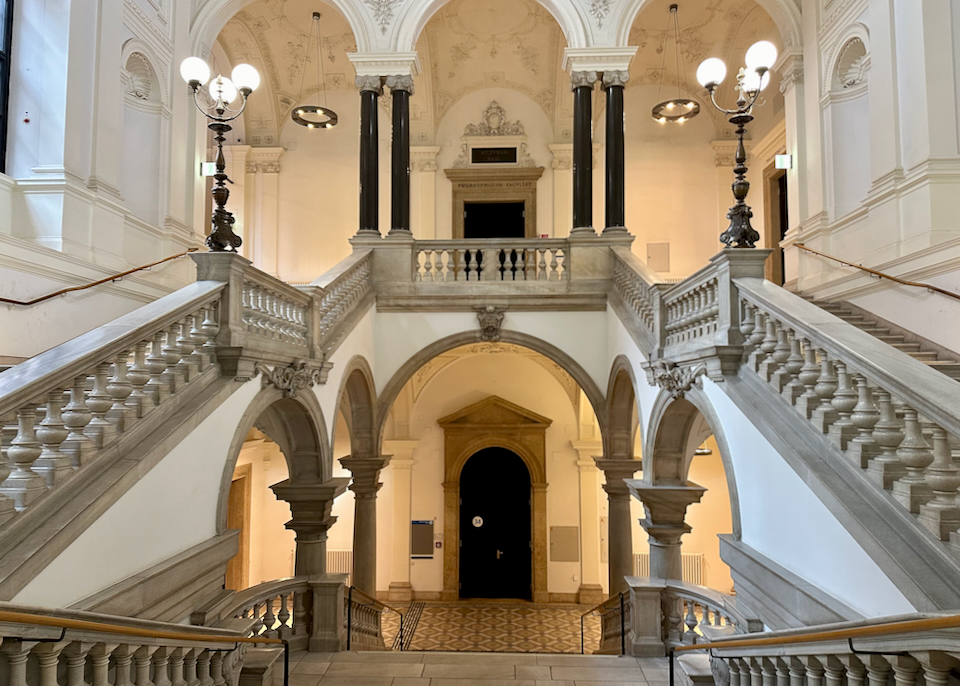
If you have the time, it’s worthwhile to take a campus tour at the University of Vienna. Founded in the 14th century, it’s one of the oldest and most prestigious universities in Europe, rich in history and stunning architecture.
Vienna Travel Tips
- Bike rental is readily available through the WienMobil Rad bikeshare system, which has over 200 stations and 3,000 bikes throughout the city; online registration required.
- Vienna International Airport is about 11 miles (18km) southeast of the city center. It serves all the major cities in Europe, as well as destinations in Asia and North America. The City Airport Train (CAT) zips between the airport and Wien Mitte station in the city center in only 16 minutes. Rapid transit line S7 also departs the airport every 30 minutes and stops at Wien Mitte (25 minutes) and Wien Praterstern (30 minutes); Railjets also depart every 30 minutes to Vienna Main Station (15 minutes), or to Wien Meidling station (30 minutes).
- The Vienna City Card (€17 for 24 hrs) offers discounts in museums, hotels, restaurants, and tourist attractions for up to 7 days and is available digitally online). It also allows free public transport. It works out cheaper the longer you stay (3 days is just €29, for example).
- Austrians speak German, albeit with a different accent to Standard High German. You’ll find a lot more English speakers in cosmopolitan Vienna than in small-town Austria, but not everyone working in shops and restaurants will understand you, especially outside the city center. Try to learn a few words and numbers in German before you go.
- Free wi-fi is available at Vienna Airport, and at around 400 wi-fi hotspots across the city (Stephansplatz, MuseumsQuartier, Naschmarkt, in the Prater, on Danube Island, in train stations, etc). Look for “wien.at Public WLAN”or “Freewave”.
Other Vienna Neighborhoods
We’ve covered our favorite neighborhoods to visit and stay in more detail above, but with more time these districts are also worth checking out:
- Simmering: Vienna’s 11th district, southeast of the city center, is home to the vast Zentralfriedhof (Central Cemetery), the resting place of Beethoven, Schubert, Brahms, Johann Strauss I and II, and actress Hedy Lamarr, plus a substantial Jewish section. A cenotaph commemorates Mozart, though he is buried in nearby St. Marx Cemetery. The district also contains Schloss Neugebäude, a 16th-century palace, and the popular Gasometers, four 19th-century gasholders converted into shops, restaurants, live entertainment venues, and a cinema. There’s not much point in staying out here, but you’ll get good rates at the excellent Simm’s Hotel and JUFA Hotel Wien.
- Penzing: The western suburb of Penzing is Vienna’s 14th district, half residential and half encompassing the slopes of the Vienna Woods. Its eastern end is home to the Technical Museum, with steam engines, planes, and hands-on exhibits popular with kids. Deeper into the district, art lovers will enjoy the Ernst Fuchs-Museum, former studio and now showcase of Fuchs’s sculpture and paintings, and Otto Wagner’s Steinhof Church, completed in 1907 for Vienna’s psychiatric hospital and a masterpiece of Jugendstil (Art Nouveau) design. Soccer fans may want to visit the Allianz-Stadion (aka Weststadion), home of top Austrian team Rapid Vienna. There’s little reason to stay in Penzing, Hotel An der Wien is best for Rapid Vienna games.
- Döbling: Vienna’s 19th district is another wealthy suburb, northwest of the city center, encompassing large swathes of Wienerwald hills and woods. Beethoven fans should travel out here to view the Eroica Haus, where the German compose wrote his Eroica symphony in 1803–4, and the nearby Beethoven Museum, which preserves the most attractive and evocative of his former Viennese homes; here he composed some of his most famous works, as well as the poignant “Heiligenstädter Testament” in 1802. You can also check out the Waschsalon Museum (“Washhouse No.2”) in the 1920s Karl-Marx-Hof public housing complex, which chronicles the “Red Vienna” period (1919–1934). Further out there are vineyards and rustic Viennese wine gardens known as “heuriger” (Müllers Heuriger & Weingut is a good one). Here, Landhaus Fuhrgassl-Huber and Living Hotel Kaiser Franz Joseph are better if you’re driving and prefer to stay in the outskirts of the city.
- Great day trips beyond the city include the enchanting 12th-century Klosterneuburg Monastery (where you can stay at Hotel Schrannenhof), and further up the scenic Danube Valley in what’s known as the Wachau, between the captivating towns of Melk and Krems. South of Vienna lies the old spa town of Baden bei Wien, where you can still enjoy open-air and indoor thermal pools. Excellent hotels in Baden include Hotel Admiral am Kurpark, Hotel Herzoghof, and At the Park Hotel. For cheaper rates try Pension Wienerstub’n.
- There’s not much point in staying near Vienna Airport (Flughafen Wien) to the southeast of the city unless you have an early flight. If you do need to stay here, the best hotels are the convenient NH Vienna Airport Conference Center and Moxy, just outside the main terminal.
Summary: My Favorite Hotels in Vienna
My Favorite Vienna Hotels
• 5-Star: Imperial
• 4-Star: Beethoven Wien
• 3-Star: H+ Hotel
• For Families: Henriette
• For Couples: Leo Grand
• Indoor Pool: Park Hyatt
• Outdoor Pool: Hilton
• Near Airport: NH Vienna
• Train Station: Motel One
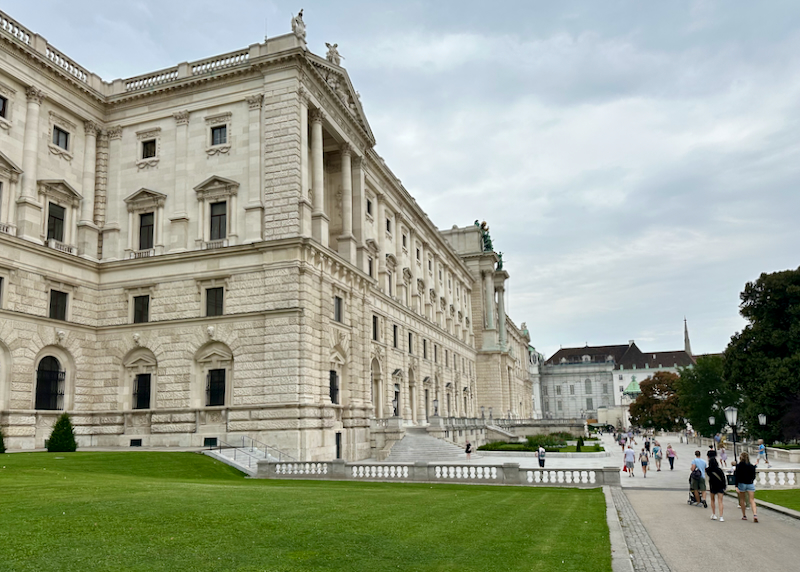
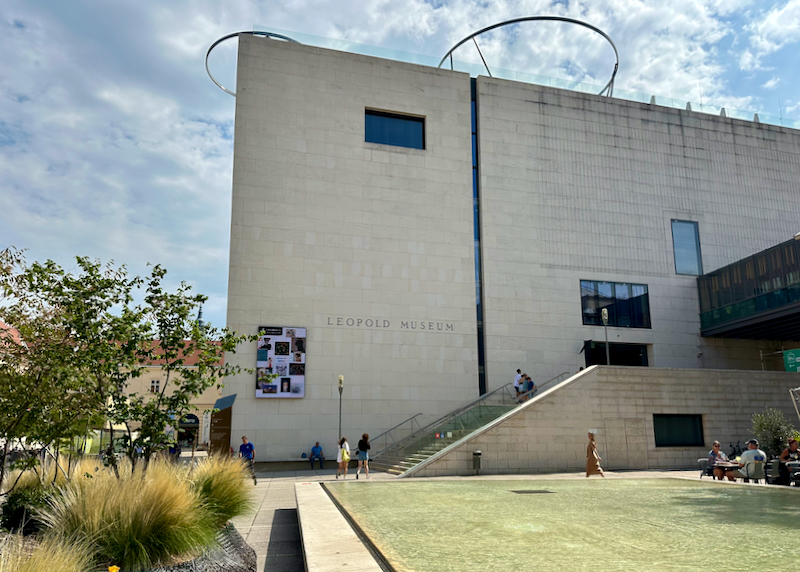
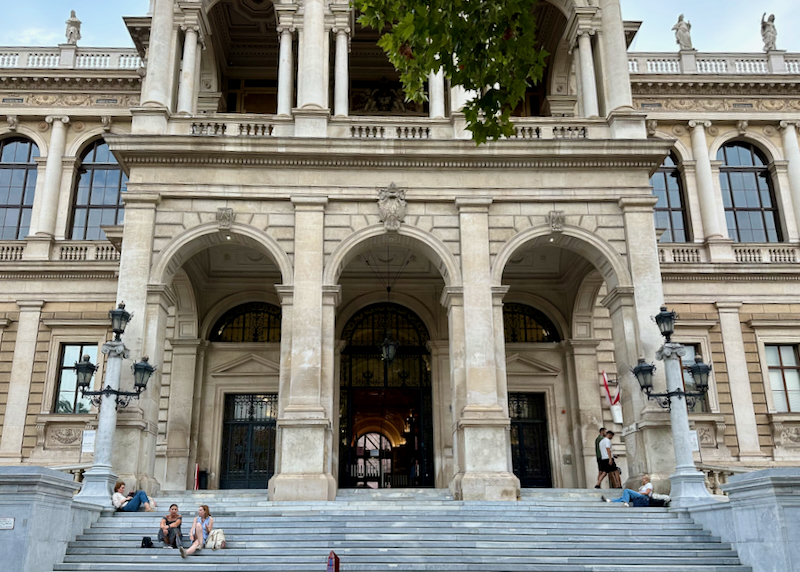
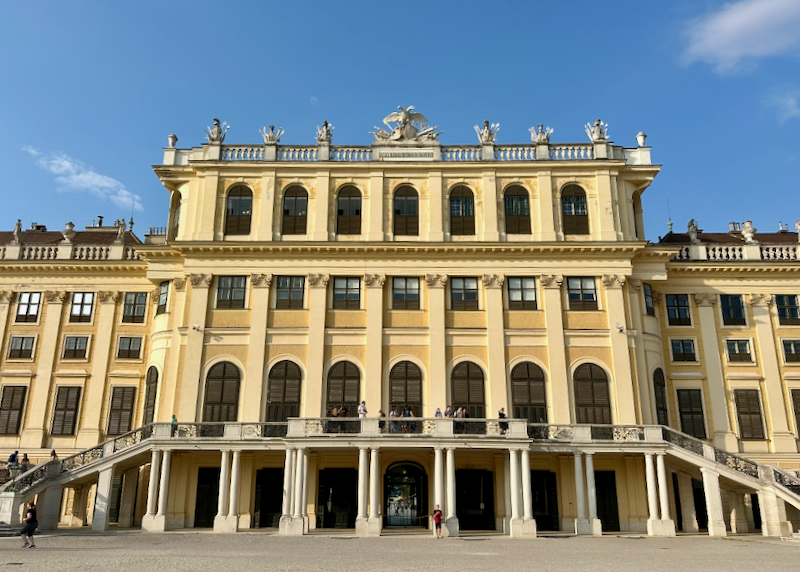
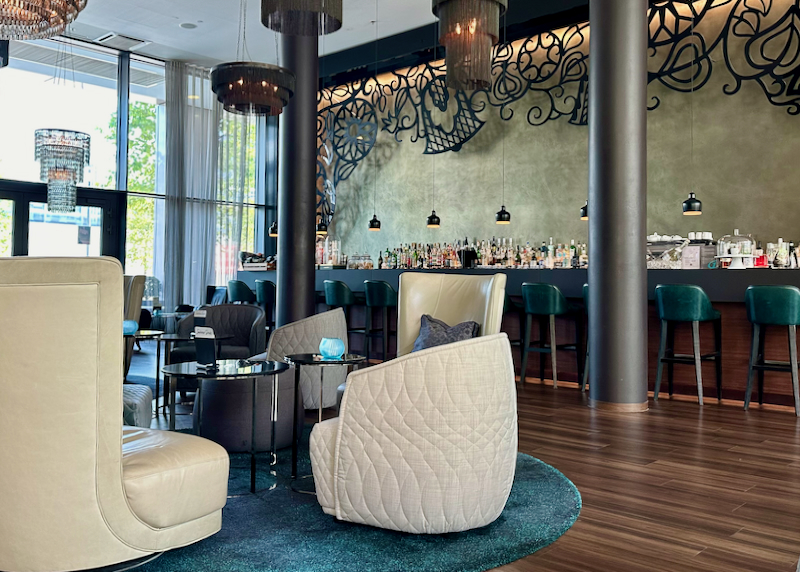
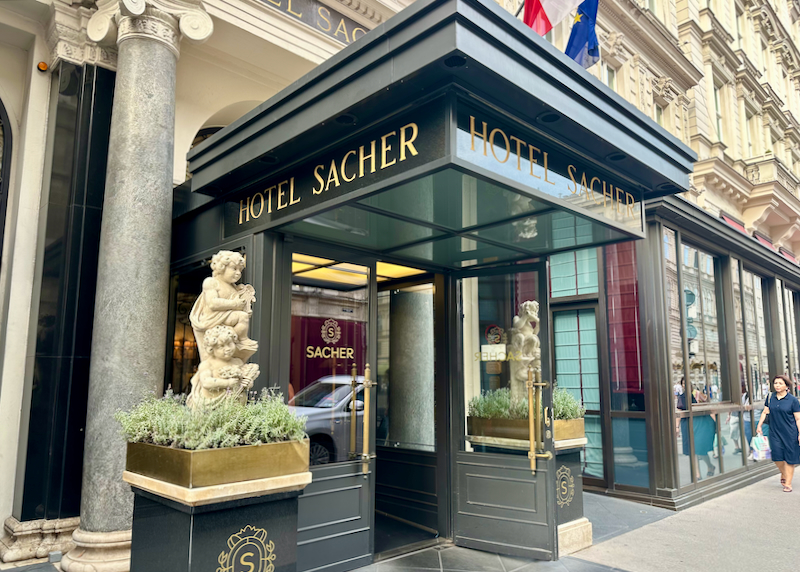
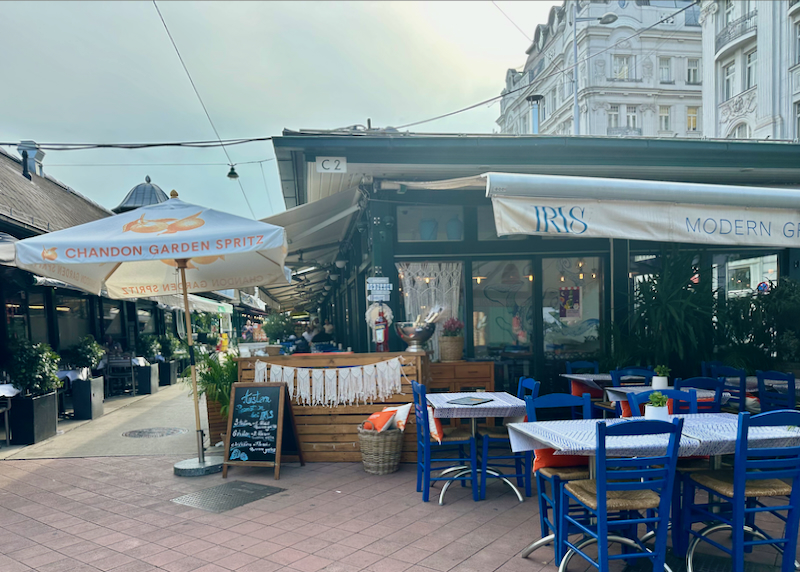
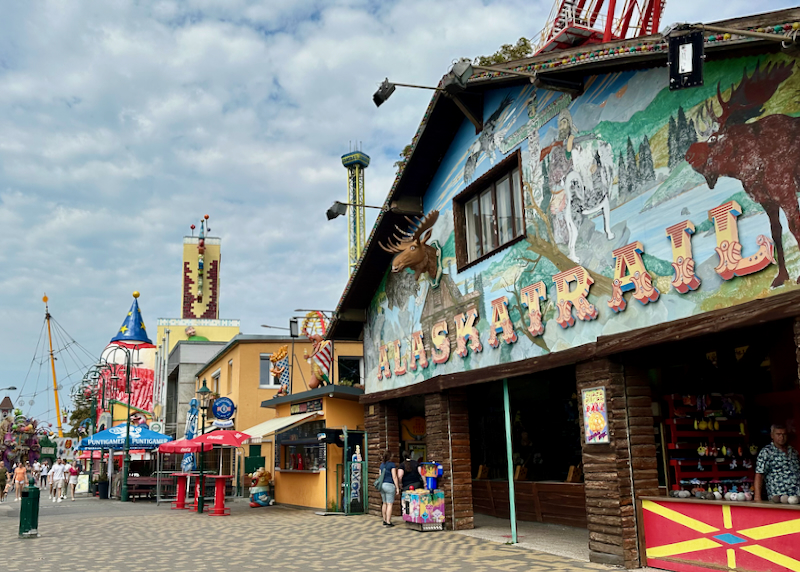
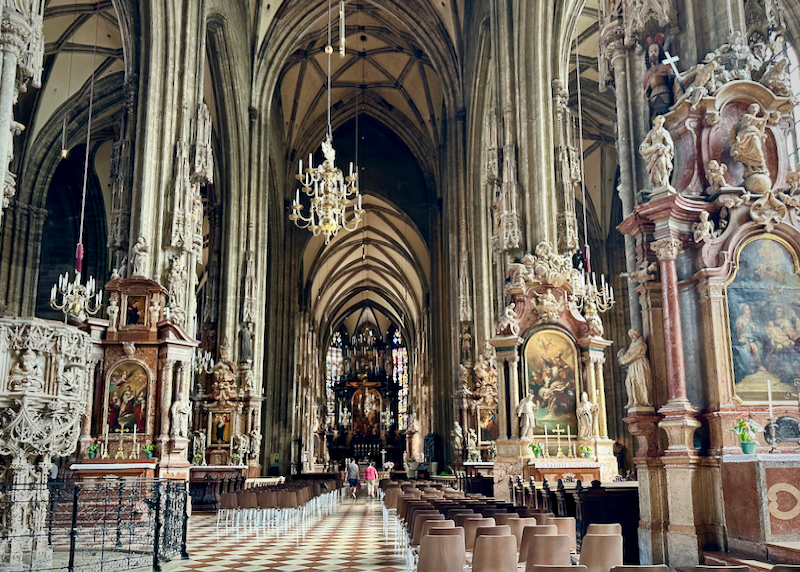
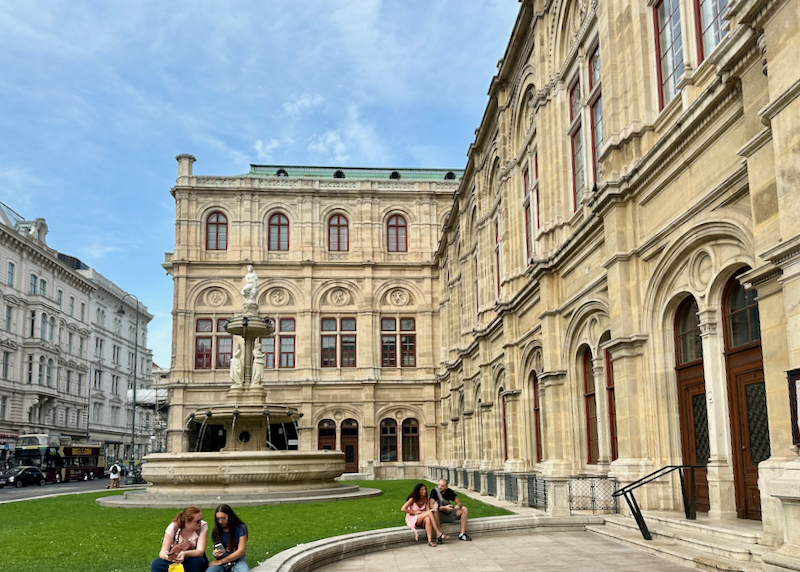
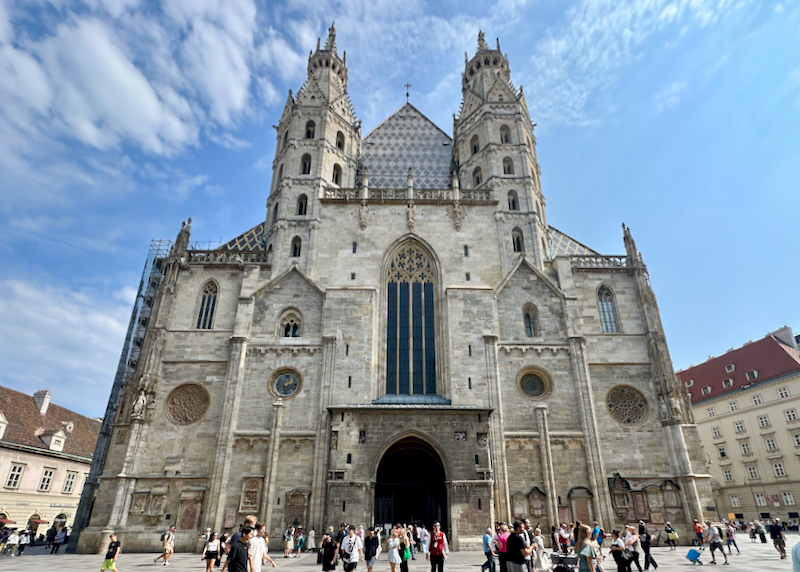
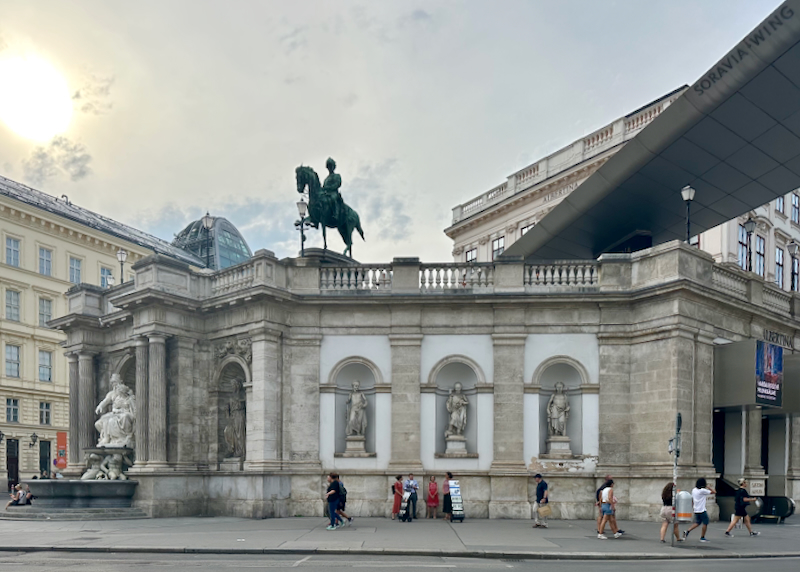
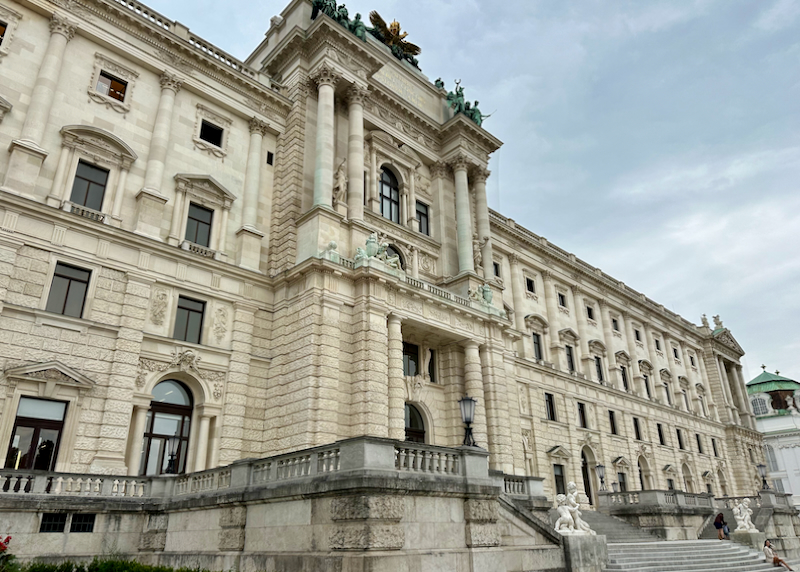
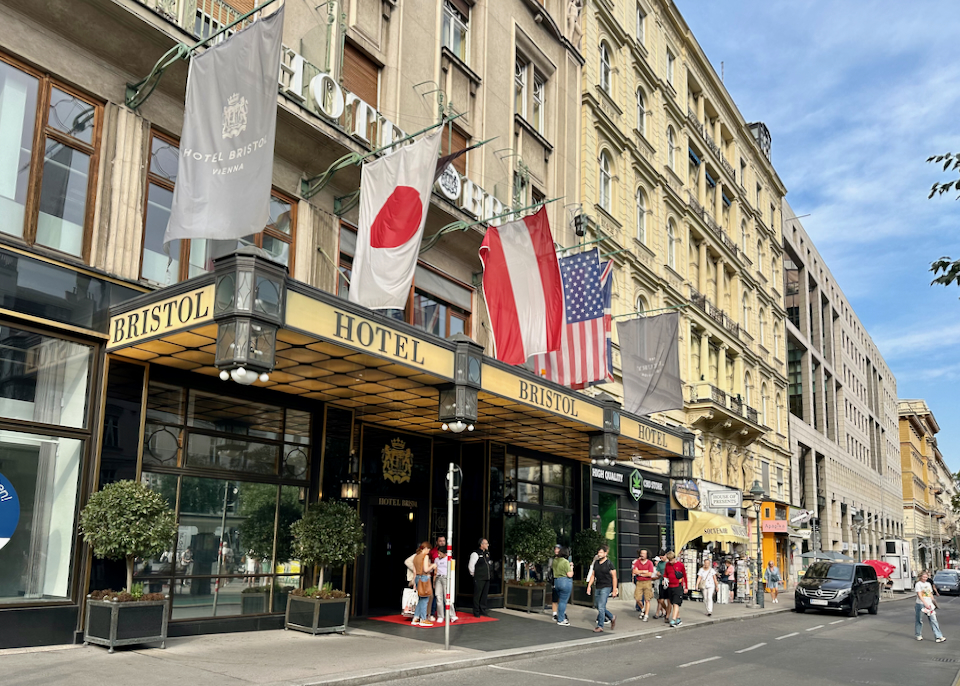
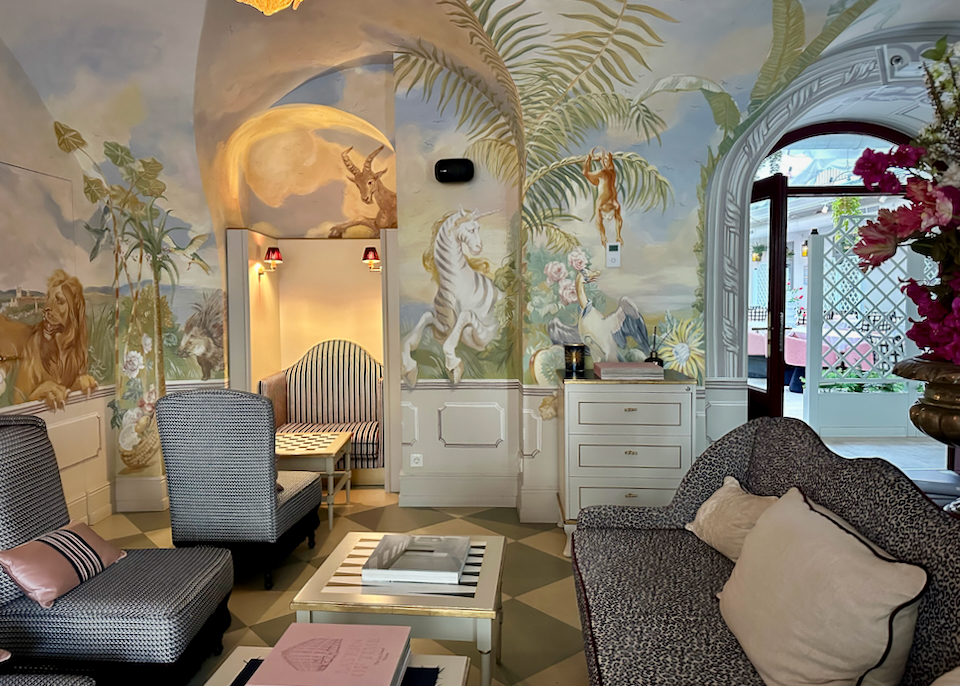
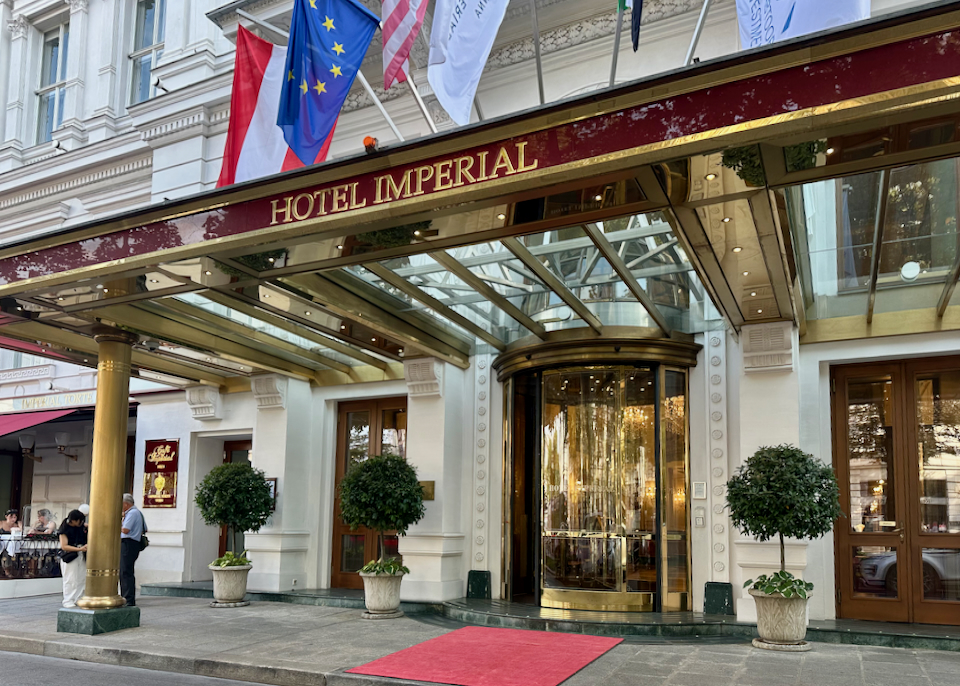
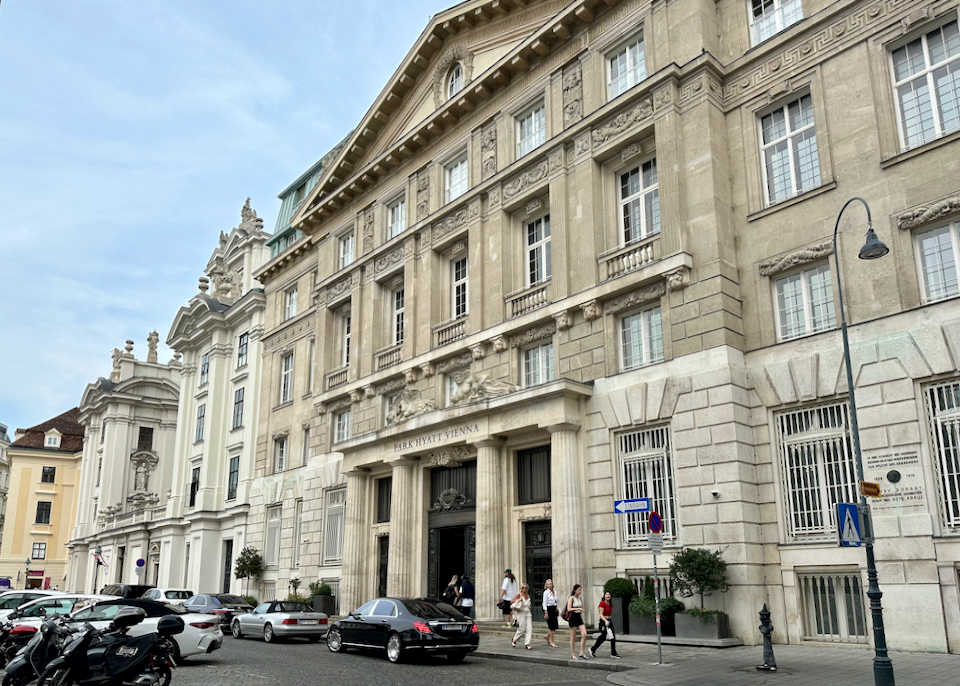
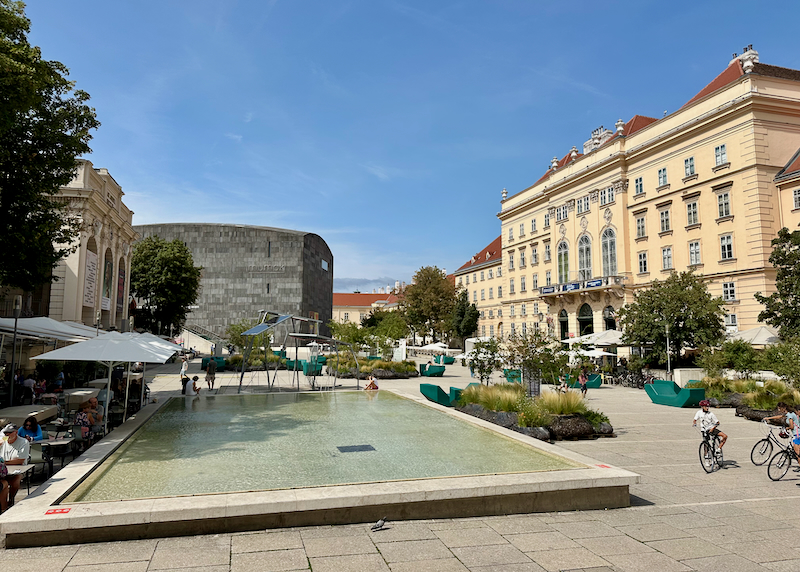
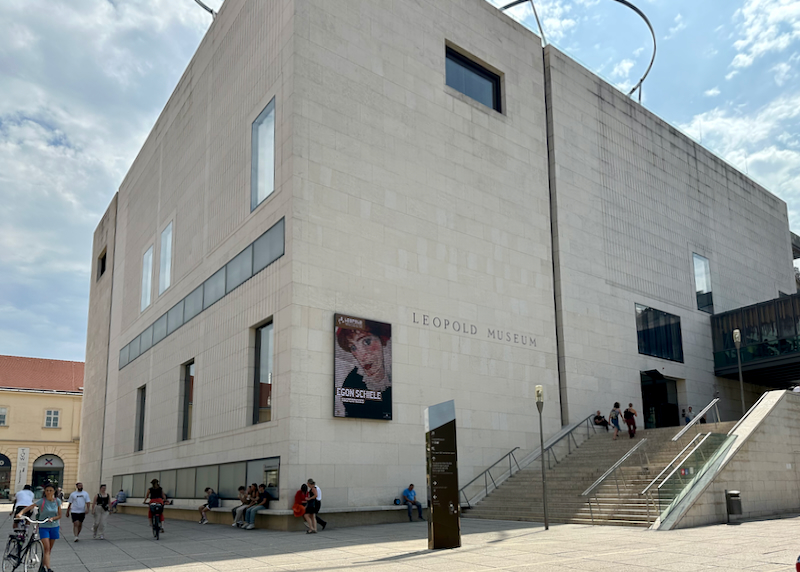
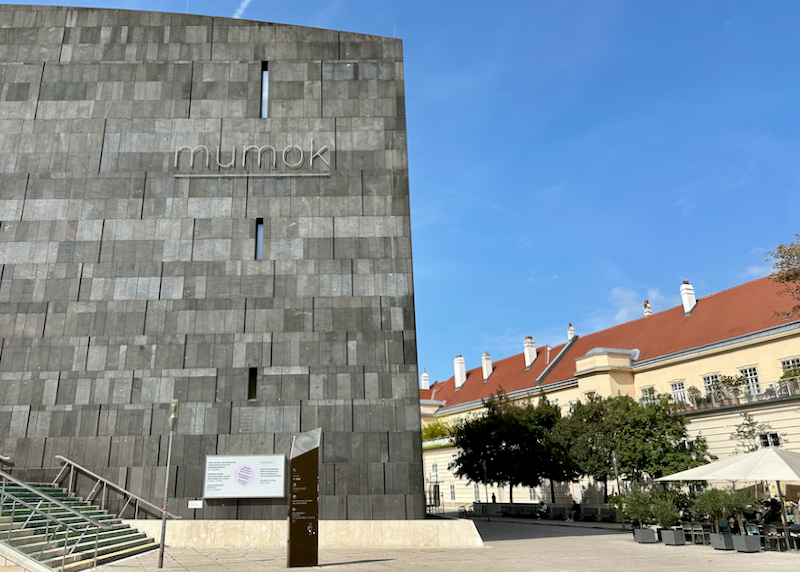
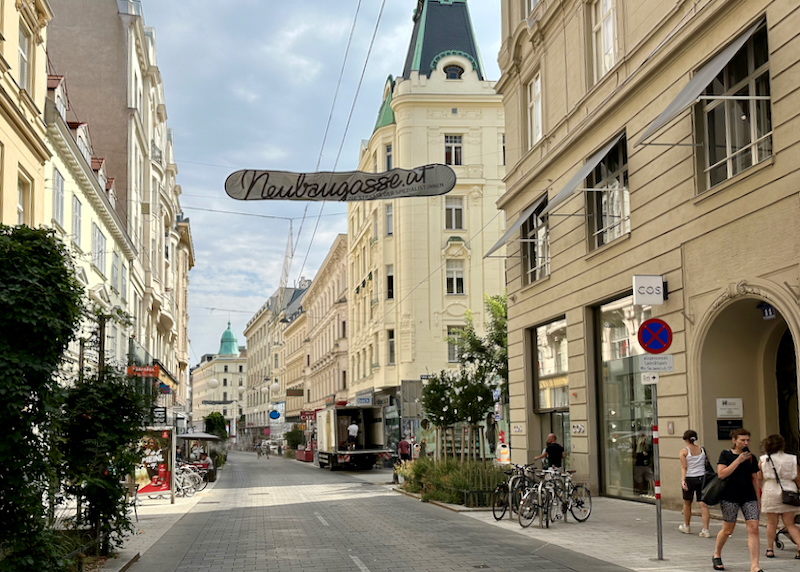
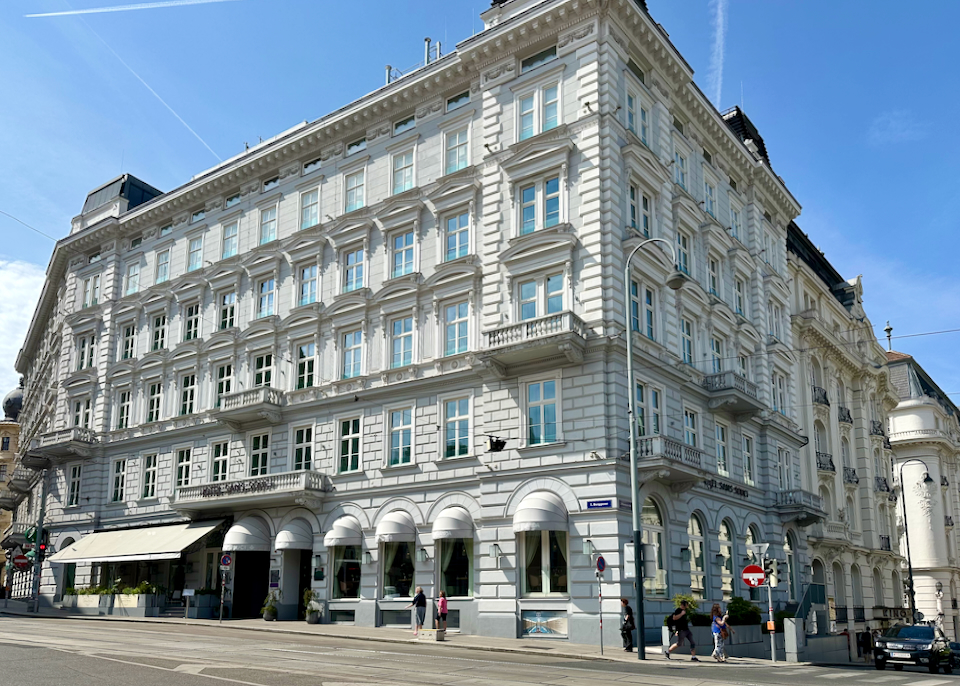
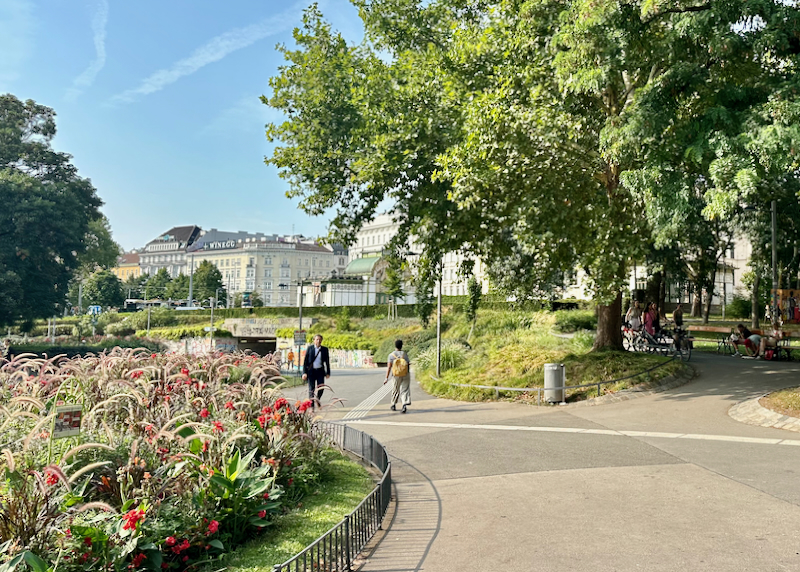
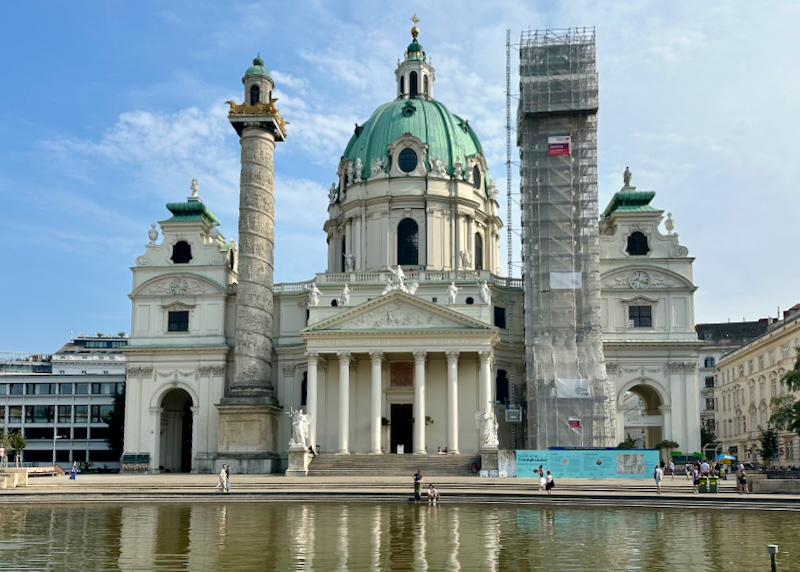
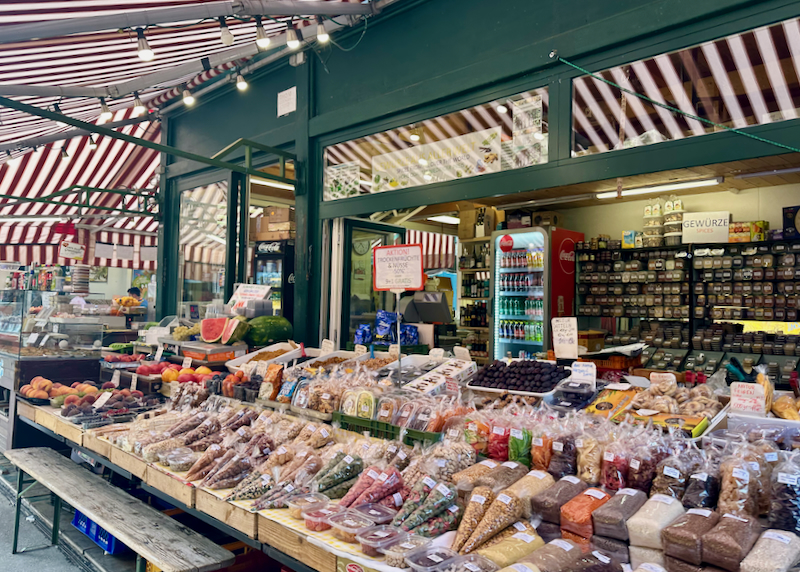
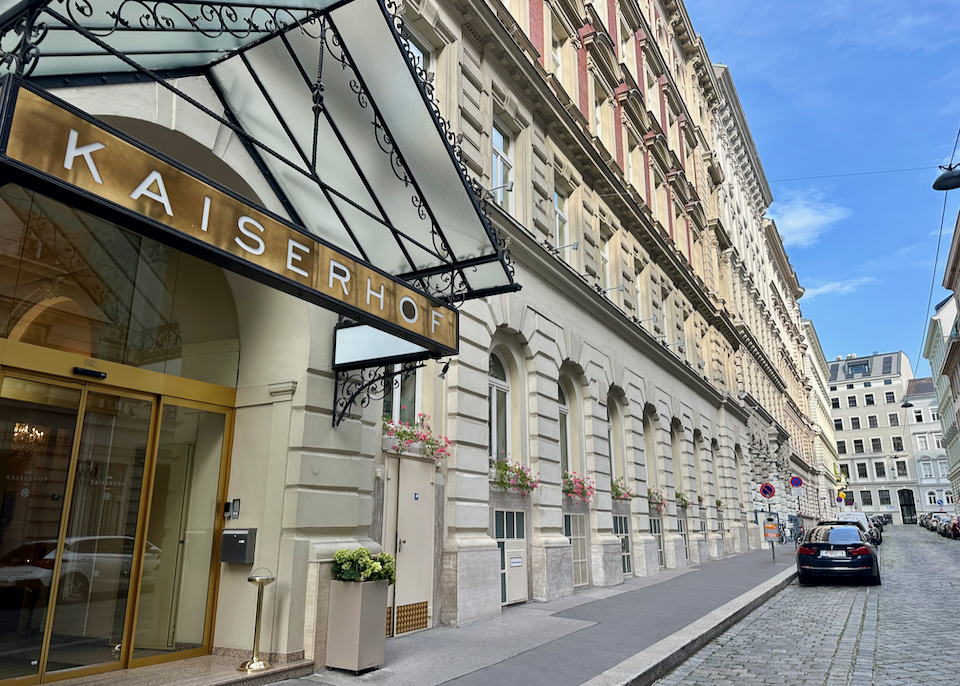
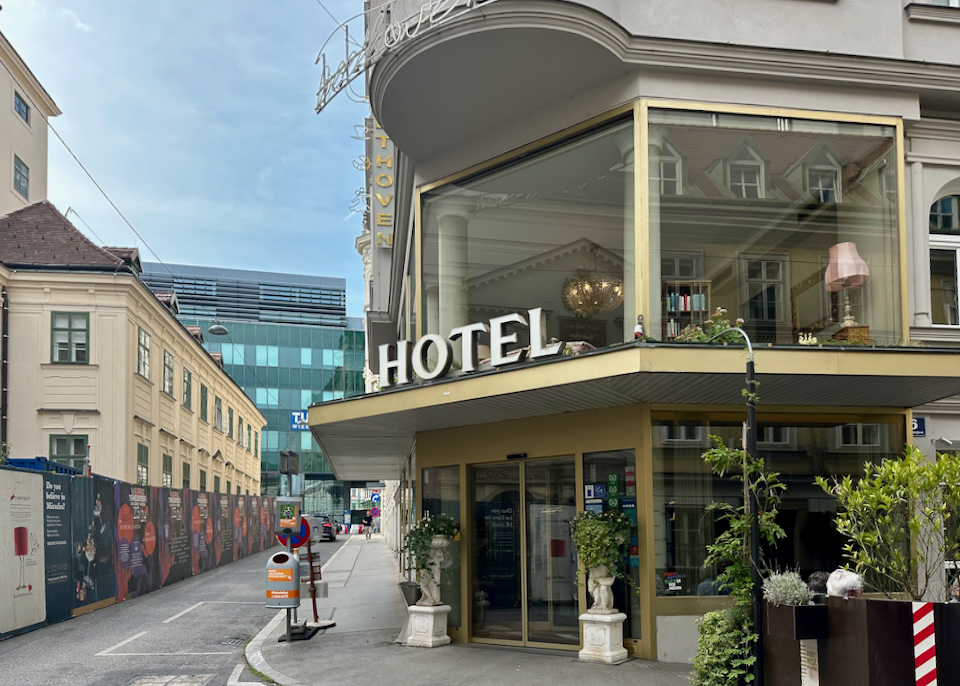
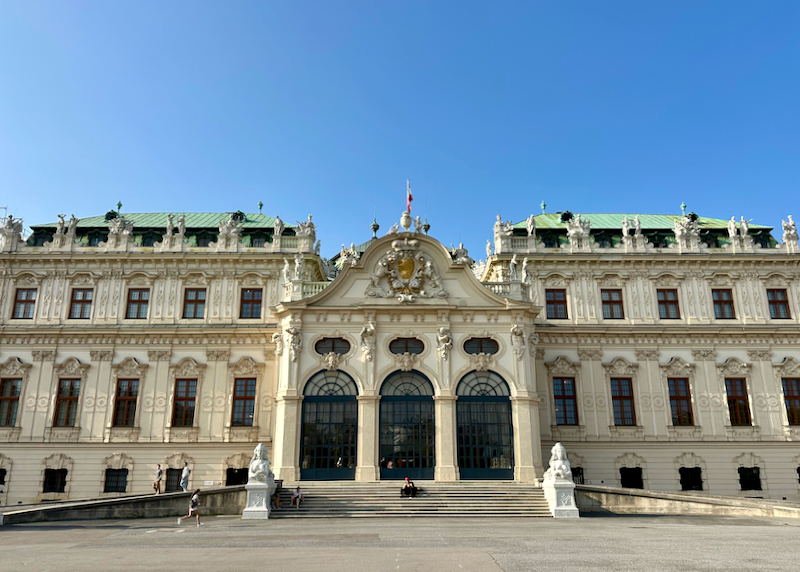
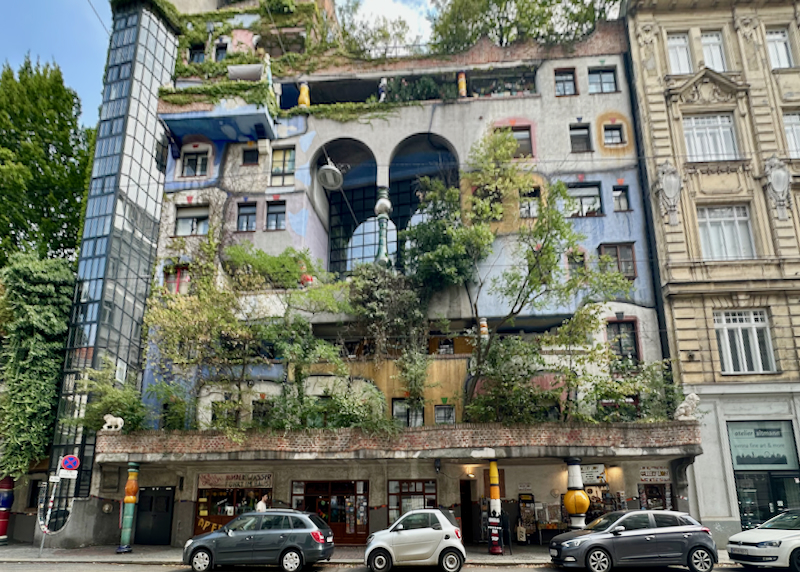
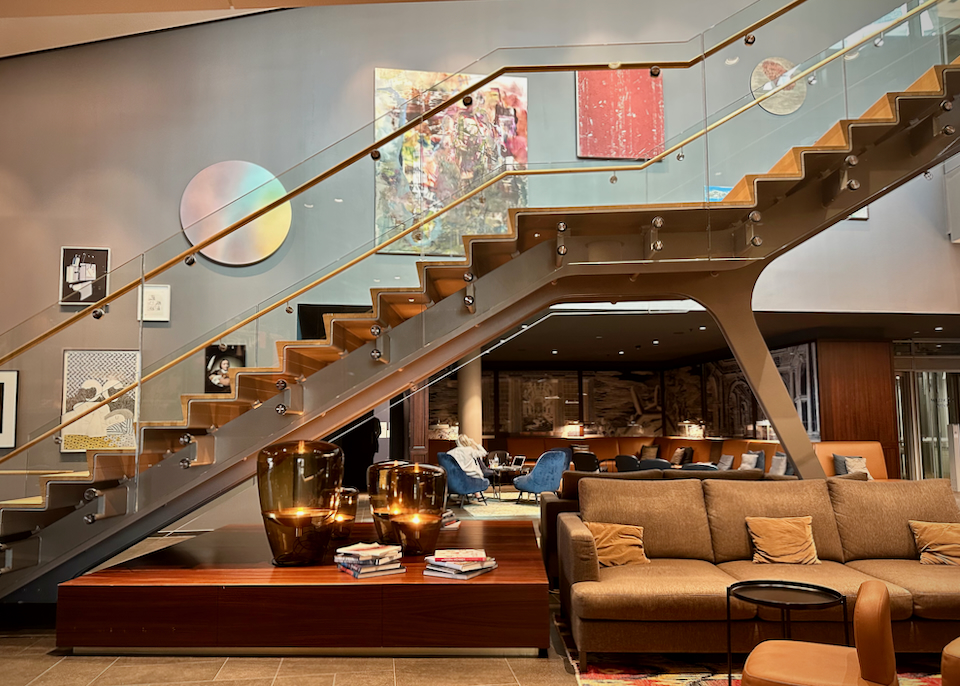
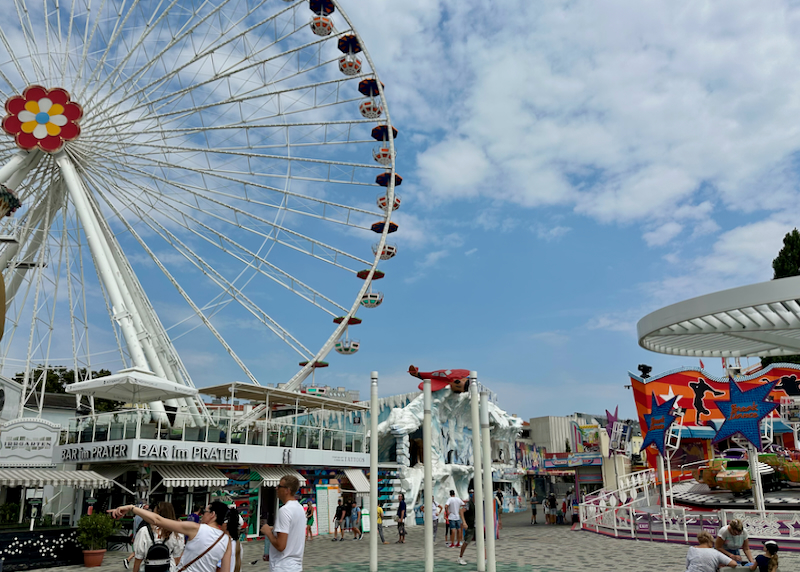
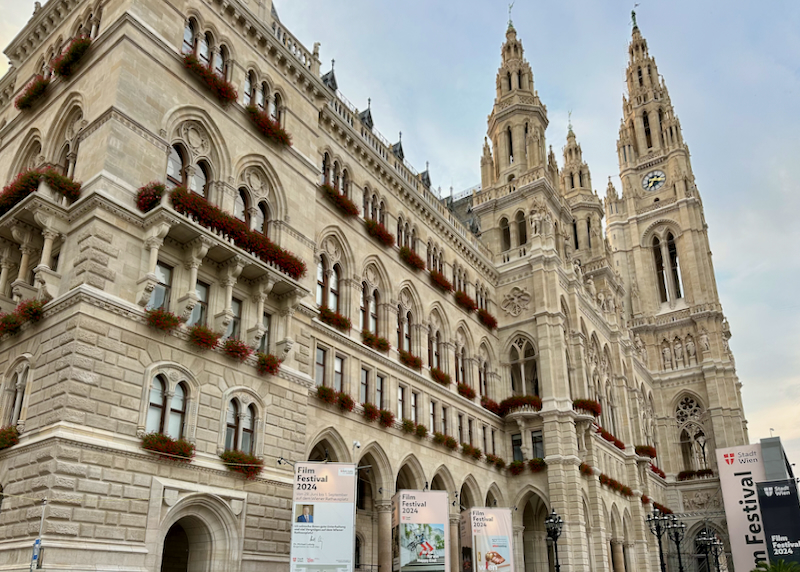
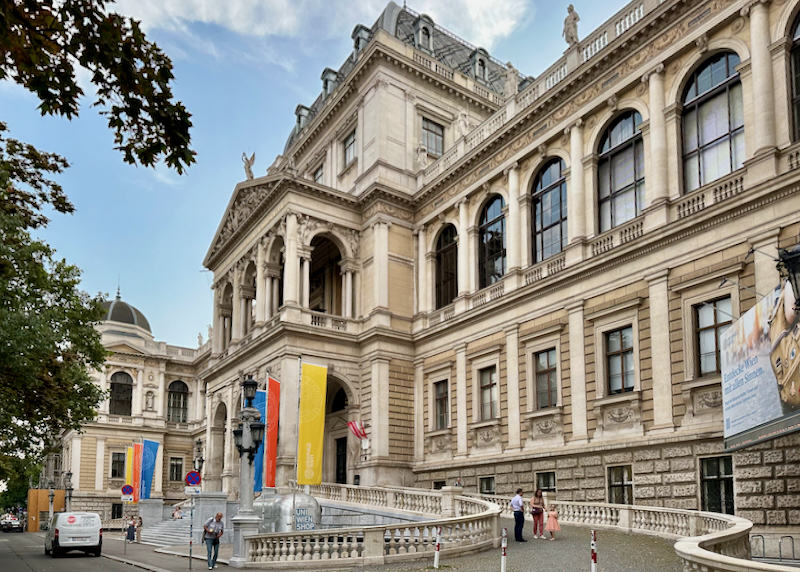
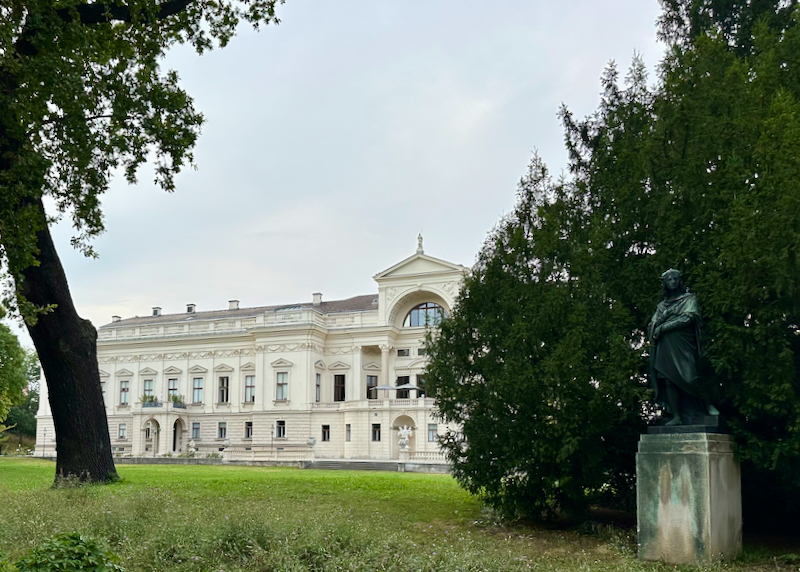
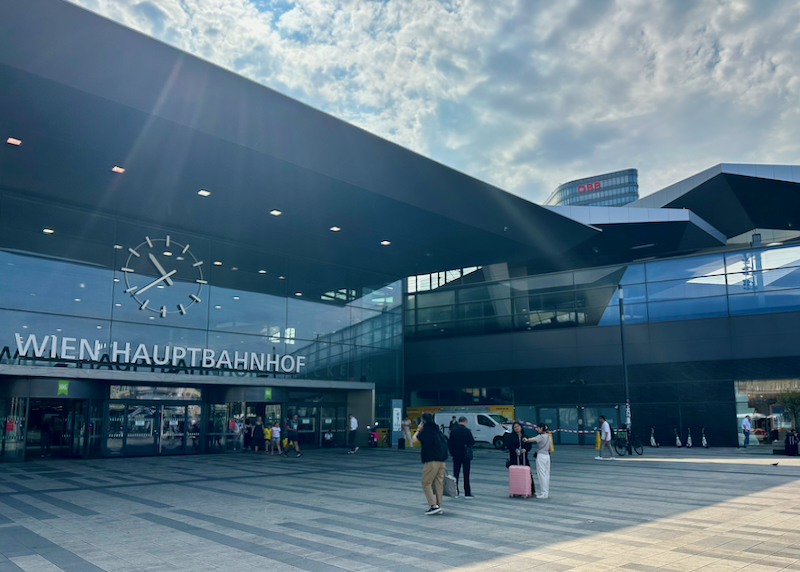
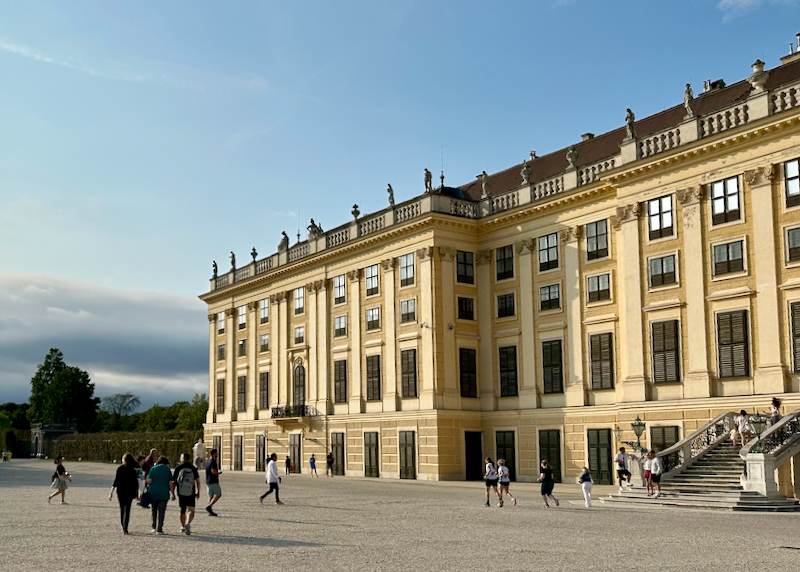
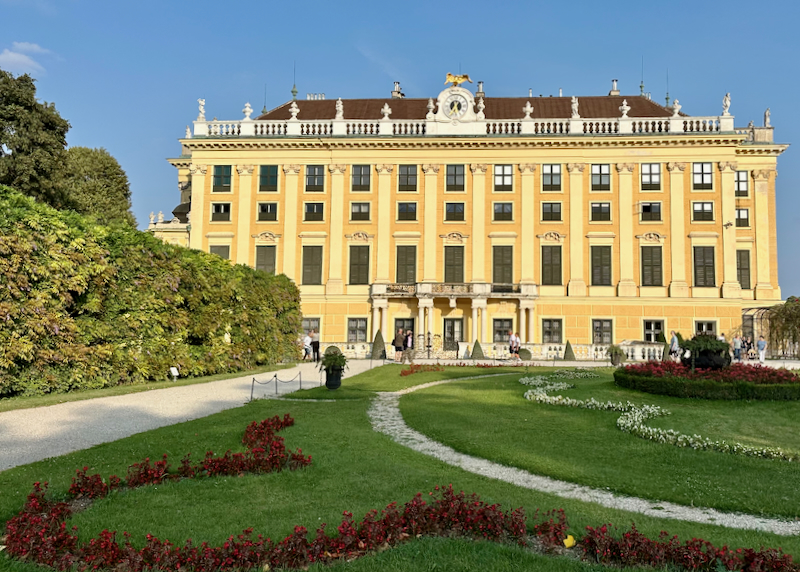
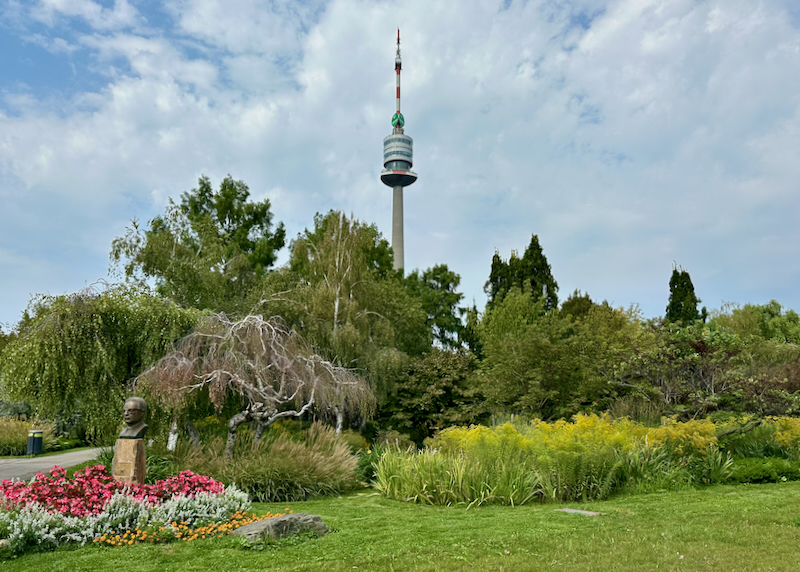
About Santorini Dave